Menu

Summer calls for beverages that not only refresh but also nourish. Enter the Mushroom-Infused Arnold Palmer—a vibrant blend of tangy lemon, natural sweetness, and the well-known adaptogenic mushrooms, Reishi and Tremella. Inspired by Kate Mahoney, FNTP, BCHN, IHS, FSS, and her original recipe, this functional twist on a classic offers a delicious way to hydrate while supporting your body’s balance on warm days.
Known for its calming, adaptogenic properties, Reishi is often used in traditional wellness practices for promoting a sense of calm and balance. Incorporating Real Mushrooms Organic Reishi Mushroom Powder into your summer drink allows you to enjoy these benefits in a simple, approachable way. As a gentle adaptogen, Reishi supports the body’s natural response to stress, especially valuable during the heat and activity of summer [1].
We use reishi in this recipe as a substitute for the tea in a traditional Arnold Palmer drink. It has the rich, somewhat bitter taste of an earthy black tea.
Also known as the “beauty mushroom,” Tremella has been traditionally valued for supporting skin hydration and promoting a healthy appearance. Its naturally occurring polysaccharides may help the skin retain moisture, contributing to a plump, dewy glow [2]. Stir in a scoop of Real Mushrooms Organic Tremella Powder for a refreshing addition to your summer hydration routine.
We add tremella to this recipe because of its wonderful hydrating properties. It has little to no flavour, so it can be added to any food or drink without changing the flavour profile.
Keep any leftover Mushroom-Infused Arnold Palmer refrigerated and consume within 72 hours for optimal freshness and potency—and remember to shake before you serve!
This refreshing blend is a delicious way to support your wellness rituals with every sip. Whether you’re lounging by the pool, hiking under the sun, or simply just taking a moment to unwind, this Mushroom-Infused Arnold Palmer offers a deliciously mindful twist on a summer classic.
Ready to sip your way into summer wellness? Give this recipe a try and let us know what you think!
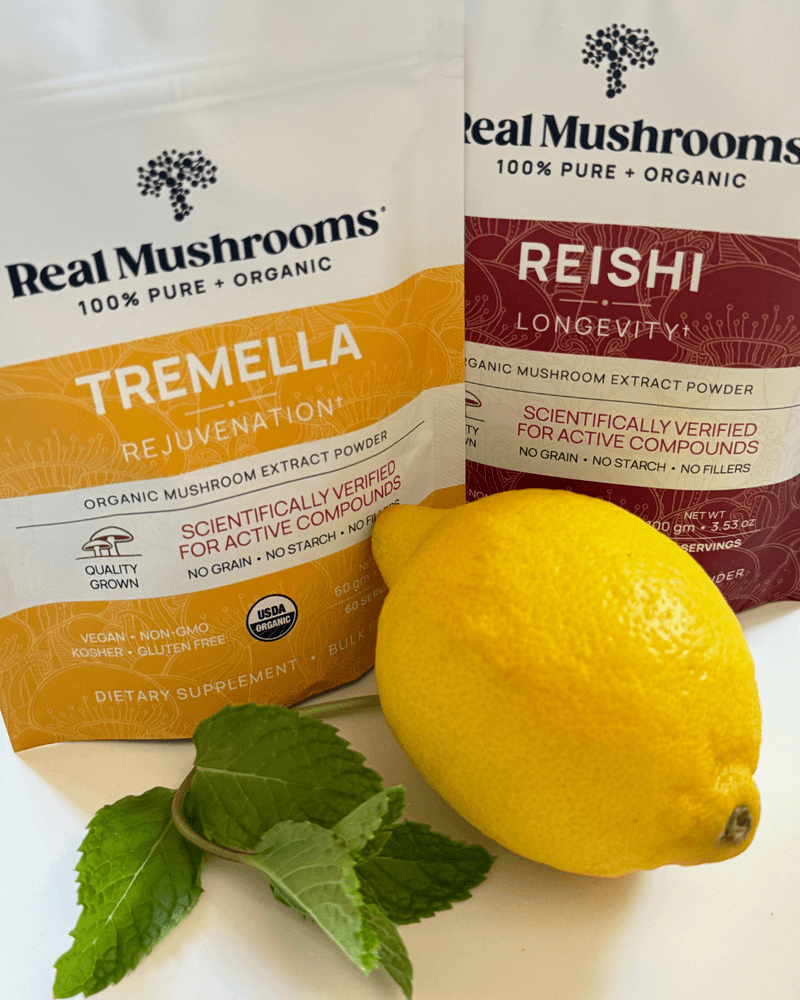

Before we dive in, here's a quick note: this isn’t a sales pitch. It’s a gut health primer—grounded in science, my clinical experience, and traditional knowledge. The goal is simple: to empower you with insights so you can make informed decisions about how mushrooms support whole-body wellness and gut health.
The gastrointestinal tract (GIT) is much more than just a digestive tube—it’s a dynamic, intelligent boundary between you and the outside world. It hosts trillions of microbes, expertly orchestrates digestion and nutrient absorption, and plays a central role in immune defense, whole-body communication, and a whole lot more.
Enter functional mushrooms: nature’s oldest—and now newly recognized—gut health champions. They've been treasured for centuries in Traditional Chinese Medicine and other ancient healing systems. However, it’s only within the past decade that science has begun to confirm their impressive prebiotic and microbiota-modulating capabilities. Rich in β-glucans, chitin, phenolic compounds, and specialized antioxidants like ergothioneine, mushrooms deliver a unique, multi-faceted toolkit designed to nourish your gut.
What truly makes mushrooms exceptional is their holistic support of the gut ecosystem. They nurture beneficial microbes, fortify mucosal barriers, modulate immune responses, support healthy inflammation responses, and even influence distant organs like the brain, liver, skin, and cardiovascular system via interconnected biological pathways—often referred to as gut–organ axes, like the well-known gut-brain axis.
In this blog, we’ll explore how mushrooms such as Reishi, Lion’s Mane, and even the humble white button mushroom can powerfully support gut health, with a focus on the gut’s barriers and defense mechanisms. We’ll unpack the science behind their benefits through a lens that blends ancient wisdom with emerging clinical evidence.
To work at its best, your gastrointestinal tract (GIT) relies on multiple protective layers—each doing a specific job, but all working together as a team. And here’s the good news: mushrooms can support every one of them.
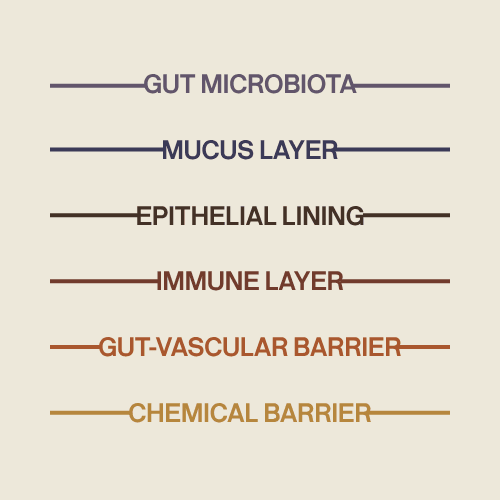
These protective layers in your gut aren’t isolated silos—they’re part of an interconnected system. They influence and support each other constantly. For example:
Together, this dynamic network helps maintain balance in the gut, what scientists call “gut homeostasis.”
But when one part of this system breaks down—whether from poor diet, stress, certain medications, infections, or environmental toxins—the whole system can be affected. One possible result? Increased intestinal permeability. This describes changes in the gut barrier that may allow microbes or microbial components, such as lipopolysaccharides (LPS), to move beyond the intestinal lining. Researchers are actively exploring how this may affect the interaction between the gut barrier and immune signaling in relation to general well-being [11], [1].
In natural medicine, restoring gut balance has always been a central theme—through herbs, broths, fermented foods, fasting, and fiber. It’s how I was trained as a medical herbalist, and it’s still a powerful foundation today.
Ongoing research continues to highlight the role of gut health in supporting energy, immune balance, mood, and overall well-being. A healthy diet remains the cornerstone: fiber-rich vegetables, fermented foods, antioxidant-rich herbs, plenty of water, healthy fats, stress-reducing practices—and yes, mushrooms—can all help support a thriving gut ecosystem.
This is a rapidly evolving field, with new insights emerging on how our gut and its microbial partners influence nearly every system in the body.
Before we get into the specific ways mushrooms support gut health, here’s a quick but important clarification: the terms microbiota and microbiome often get used interchangeably, but they refer to different things. Understanding this distinction will help make sense of the research and clinical insights we’ll explore below.
(Feel free to skip the next section if you’re busting to dive into the mushroom content—it’ll still make sense.)
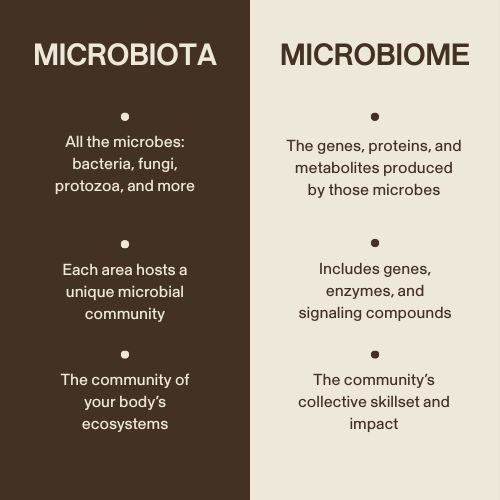
Your microbiota refers to the full community of microorganisms, bacteria, fungi, protozoa, and archaea that live in or on different parts of your body. These communities are highly specific to their environment and respond to changes in age, diet, hormones, medications, and lifestyle [36].
While the gut microbiota gets most of the attention (and for good reason), your body actually hosts multiple distinct microbiotas, including those found in the:
Think of the microbiota as the residents of a city or town—who they are, where they live, and how many of them there are.
The microbiome, on the other hand, is all about function. It refers to the collective genes, proteins, enzymes, and metabolites produced by those microbial communities.
It includes:
So if the microbiota is about who’s there, the microbiome is about what they can do.
This includes helping to digest food, produce certain vitamins, maintain immune balance, and even influence mood and brain function—all through their interactions with the gut, immune system, and nervous system.
Among the many compounds produced by the microbiome, short-chain fatty acids (SCFAs)—including butyrate, acetate, and propionate—are especially important. They help nourish the gut lining, regulate immune signals, and influence communication between the gut and other organs [40].
Fascinating Fact: Several body areas have unique microbiomes shaped by local microbes and conditions. For instance, in your armpits, microbes break down sweat into odor compounds, and stress hormones can shift this scent by altering sweat chemistry.
Now that we’ve clarified who the microbiota are and what they can do, let’s explore how mushrooms directly shape this microbial ecosystem, not passively, but as active modulators of both composition and function.
A healthy microbiome isn’t just about having more “good bugs.” Two key markers of resilience are:
A diverse and balanced microbiota is more adaptable, better at resisting stressors, and more capable of maintaining immune and metabolic balance.
In practice, I often use PCR-based stool testing to measure microbial profiles. I’ve seen species counts as low as 100 and as high as 280. But numbers alone don’t tell the whole story. One patient might have moderate richness but remarkable balance—no single microbe dominating. Another might show dominance by one or two species—accounting for over 20% of the total population—which can affect microbial balance and reduce adaptability within the gut ecosystem..
These tests help reinforce a key insight: it’s not just how many microbes there are, but how they coexist.
Studies of traditional populations like the Hadza or Yanomami consistently show microbial richness exceeding 400–600 species [25], [7]. Their diets are high in wild plant fiber and free of ultra-processed foods and pharmaceuticals—conditions that help shape some of the most robust microbiomes on record.
While we can’t exactly recreate that environment, mushrooms offer a promising nutritional approach to support gut microbial balance and diversity.
Mushrooms are rich in non-digestible, fermentable polysaccharides—including β-glucans, chitin, oligosaccharides, and non-starch alpha-glucans—which bypass digestion in the upper gut and reach the colon, where they are fermented by microbes into health-promoting compounds.
These include short-chain fatty acids (SCFAs) like:
SCFAs are not waste products—they are highly active metabolites that communicate with the brain, immune system, liver, and beyond.
Recent research confirms this impact. A 2023 pilot study showed that daily mushroom supplementation increased levels of butyrate and propionate while also boosting gut IgA—a key marker of mucosal immunity (Nishimoto et al., 2023). These benefits were especially pronounced in individuals with more balanced baseline microbiota.
In another recent study, Zavadinack et al. (2024) showed that structural differences in mushroom β-glucans—especially 1,3 and 1,6 linkages—can alter how they are fermented by gut bacteria, selectively enhancing beneficial microbes and SCFA output [39]. Importantly, this study examined both soluble and insoluble β-glucans, each offering distinct yet complementary benefits. Soluble fibers tend to ferment more quickly and produce acetate and propionate, while insoluble fibers support sustained SCFA production deeper in the colon, producing more butyrate. That’s why I look for mushroom products that retain both—Real Mushrooms Lion’s Mane, for instance, contains the full spectrum of soluble and insoluble β-glucans and remains one of my go-to options in clinical practice and personal use. Tremella and Chaga are also great choices.

Let’s get specific. Different mushrooms appear to nourish different bacterial allies:
These aren’t superficial shifts—they have a ripple effect influencing multiple aspects of health, including:
In other words, this isn’t just about digestion—it’s about systemic balance.
Mushrooms are more than fiber—they are rich in compounds that support microbial balance, SCFA production, and gut barrier integrity. s. By feeding the right microbes and activating key metabolic pathways, they create additive effects that extend far beyond the gut, touching mood, metabolism, inflammation, and immune tone.
When we step back and look across all these systems—the microbiota, the mucosal barrier, the immune network, the gut–brain axis, and beyond—a clear theme emerges: mushrooms help maintain balance.
Not with brute force, but with nature’s nuance—supporting resilience at both the microbial and cellular level. For patients and practitioners alike, this makes medicinal and culinary mushrooms compelling allies in the ongoing care of gut and systemic health.
So whether you stir Lion’s Mane into your morning tonic, cook with white button mushrooms at dinner, or take Reishi as part of your daily routine, know that you’re feeding more than your belly. You’re nourishing a complex ecosystem of intelligence, defense, and deep interconnection.
And don’t stress about getting it perfect. I recently challenged myself to eat 100 grams (about 3 oz) of mushrooms every day for a full month—31 days straight. And as much as I love mushrooms, I’ll be honest: there were a few days where I really had to force it down. That experience reminded me that while culinary intake is valuable, it isn’t always practical or sustainable for everyone.
That’s why being relaxed about how you get your mushrooms—whether through food, a supplement routine, or a bit of both—makes the most sense. The more mushrooms you can comfortably include, the better. What matters most is consistency: making them part of your daily rhythm, over weeks, months, and ideally, over the course of a lifetime. That’s where the real magic happens.

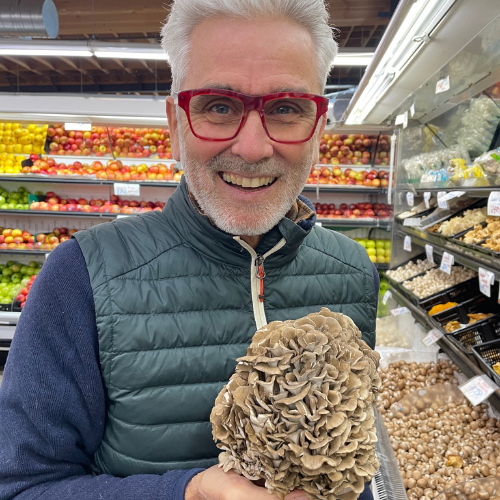
I’m excited to share insights on a topic at the heart of what Real Mushrooms does: quality. While it might seem like a nerdy or complex subject, ensuring you get the best functional mushrooms that will be both effective and safe for you, your family, and your pets is critical.
Quality is everything when it comes to functional mushrooms. It’s not just about making a product that’s easy to sell—it’s about respecting the centuries of traditional use, incorporating clinical insights, and being guided by rigorous scientific research. At Real Mushrooms, we’re committed to creating products that genuinely benefit your health, free from shortcuts or compromises.
The use of functional mushrooms is far from a modern phenomenon. Take Reishi, for example, one of my personal favorites. This remarkable mushroom boasts a history spanning over 4,000 years, deeply rooted in traditional practices. To honor this heritage, Real Mushrooms combines ancient wisdom with modern science to create products that are not only effective but also authentic.
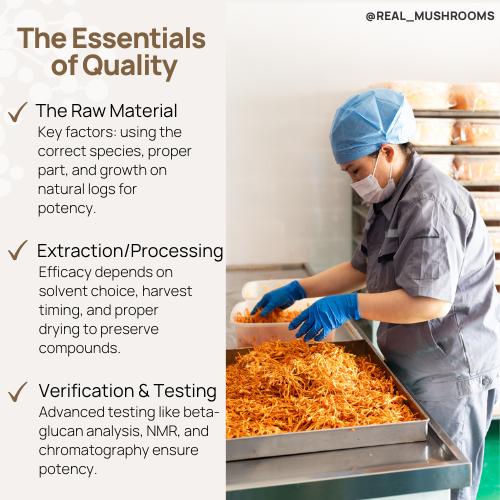
Everything starts with the mushroom itself. It’s crucial to use the correct species, avoid substitutions or adulterations, and harvest the right part of the mushroom. For example:
The way mushrooms are processed plays a significant role in their efficacy. Key factors include:
To ensure quality and consistency, we employ advanced testing methods, including:
Reishi, often called the “Mushroom of Immortality,” exemplifies our commitment to quality. The best reishi grows in shaded, moist conditions similar to its natural forest environment. At Real Mushrooms, our reishi is cultivated on logs—a process that enhances the development of triterpenes, the compounds responsible for its characteristic bitterness and potent health benefits.
Interestingly, the bitterness of reishi is a hallmark of its quality. The more bitter the mushroom, the higher its triterpene content, making it more effective as a health supplement.
Note: Reishi is a functional mushroom that is more costly to grow and extract than most. As a result, few reishi supplements on the market meet the highest quality standards, and several products have been found not to contain reishi at all!

Functional mushrooms have long been valued for their ability to support wellness, from boosting immunity to promoting longevity. Today, modern science validates these traditional uses, confirming the benefits of beta-glucans, triterpenes, and other compounds unique to mushrooms.
By honoring tradition and integrating cutting-edge research, Real Mushrooms ensures that every product delivers meaningful health benefits. Whether you’re taking reishi for immune support, lion’s mane for cognitive health, or cordyceps for energy, you can trust that our products are rooted in integrity.
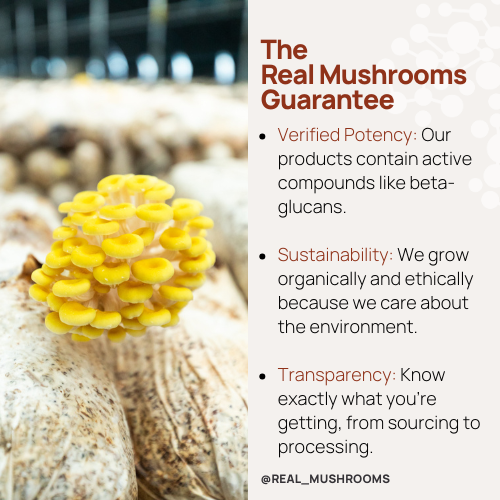
When you choose Real Mushrooms, you’re choosing:
Quality is not just a buzzword for us—it’s the foundation of everything we do. From sourcing the finest raw materials to employing rigorous testing and adhering to traditional practices, Real Mushrooms is committed to delivering the best functional mushrooms.
Stay tuned for more insights as we dive deeper into the world of mushrooms in future posts. Together, let’s honor the tradition, embrace the science, and support our health with the best nature has to offer.
Thanks for joining me on this journey. Here’s to your health and wellness!

As we embrace the new year, many of us set goals to improve our physical, mental, and emotional well-being. In 2025, the focus on health resolutions continues to grow, with trends like mindfulness, sustainable living, and natural health solutions taking center stage. Here's how mushrooms, nature’s versatile gems, can help you achieve your wellness aspirations this year.
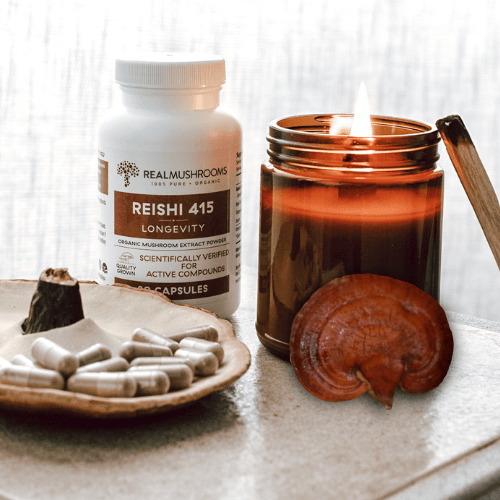
With the increasing complexity of our lives, achieving mental clarity is a top priority. The best-known mushroom for brain benefits is lion’s mane (Hericium erinaceus). However, there are other multi-functional mushrooms for supporting brain health, cognition, and mood. These mushrooms include reishi (Ganoderma lucidum) and cordyceps (Cordyceps militaris).
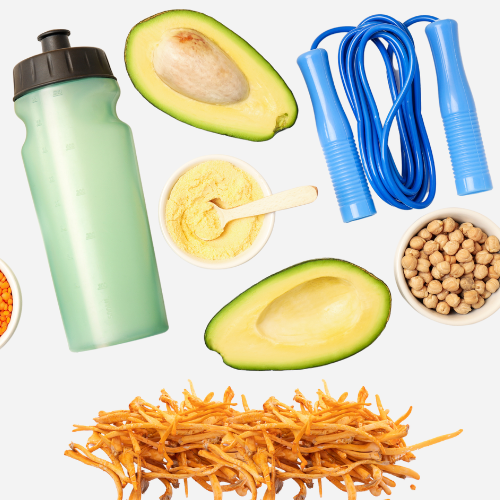
For those focusing on physical goals, mushrooms like cordyceps can support energy and endurance. Cordyceps have been used traditionally to enhance athletic performance and aid post-workout recovery. Add them to your smoothies or pre-workout routines to stay on top of your fitness game.
Fitness enthusiasts can benefit from incorporating mushrooms like cordyceps and reishi into their routines.

Did You Know? Compounds in cordyceps (primarily, cordycepin) can increase the availability of adenosine triphosphate (ATP), an energy-storage molecule. Since enhancing ATP production can have cognitive-enhancing effects, and overall anti-fatigue effects, cordyceps can be an ally for supporting focus and cognitive energy.
This year, activities that combine mindfulness and sustainability are in demand. Mushroom gardening—a beginner-friendly and rewarding hobby—is an excellent way to connect with nature, reduce stress, and grow your own food. Cultivating your own mushrooms can also be a sustainable way to enjoy fresh, nutrient-rich produce.
Immune health continues to be a priority, and functional mushrooms like reishi (Ganoderma lucidum) and turkey tail (Trametes versicolor) are among the most effective natural tools for supporting your body’s defenses. These mushrooms have been revered for centuries in traditional medicine and are now celebrated in modern wellness for their potent immune-modulating properties.

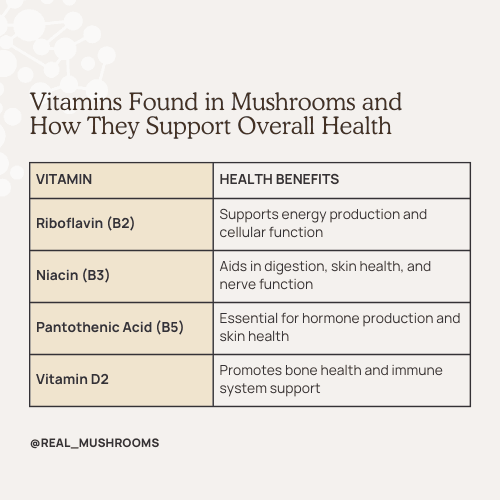
Cooking with mushrooms is a resolution that combines the joy of culinary exploration with nutritional health benefits. Mushrooms are incredibly versatile, offering a unique array of flavors and textures, from the meaty satisfaction of lion’s mane to the earthy richness of shiitake. Whether you’re a gourmet chef or a home cook, mushrooms can elevate your meals while supporting your healthy diet.
Protein:
Dried mushrooms, such as shiitake and oyster, can contain up to 30 grams of protein per 100 grams, rivaling many animal-based protein sources. Moreover, mushrooms are a complete protein source, containing all nine essential amino acids needed for optimal health and recovery. Since fresh mushrooms contain protein, have a dense texture and satisfying umami flavor, they make an excellent meat substitute and are ideal for keto diets.
Vitamins (B & D):
Fiber:
Mushrooms are an excellent source of dietary fiber, including beta-glucans, which promote gut health, improve digestion, and help regulate cholesterol levels. Their fiber content also contributes to feelings of fullness, making mushrooms a great addition to weight-management diets.
Antioxidants:
Functional mushrooms like reishi, chaga, and golden oyster contain high levels of antioxidants, including ergothioneine and glutathione. These compounds help protect cells from oxidative stress, modulate inflammatory markers, and support overall cellular health and longevity.
Explore our recipes to learn how easy and delicious it is to indulge in culinary creativity with fresh, dried, or extracted mushrooms.
Did You Know? Mushrooms are one of the only natural, non-animal-based sources of vitamin D! You can easily enhance the vitamin D content of mushrooms at home—just place them gill-side up in direct sunlight for a few hours before cooking!
As you set your intentions for 2025, consider incorporating mushrooms into your wellness routine. Whether it's through supporting your workouts, enhancing your diet, or boosting brain power, mushrooms offer a natural, versatile way to attain your personal goals.
Let this be the year you grow with mushrooms!

Nootropic mushrooms, also known as functional mushrooms, have gained popularity for their potential to support brain health and cognitive function. These mushrooms are made into mushroom supplement products, earning their nickname “smart mushrooms.”
Nootropic mushroom supplements offer various benefits, which may affect memory, focus, and mental clarity. Some examples of these dietary supplements include capsules or bulk powders made from reishi mushroom extract or lion’s mane mushroom extract.
This article explores the different types of nootropic mushrooms, their benefits, safety, and how they can be incorporated into daily life.
Nootropic mushrooms, also known as "smart mushrooms," are fungi believed to support cognitive functions such as memory, creativity, and motivation. These are often sold as mushroom supplements, which are an easy purchase and consumption method for customers.
These mushrooms contain bioactive compounds that interact with the brain to affect mental performance and overall brain health.
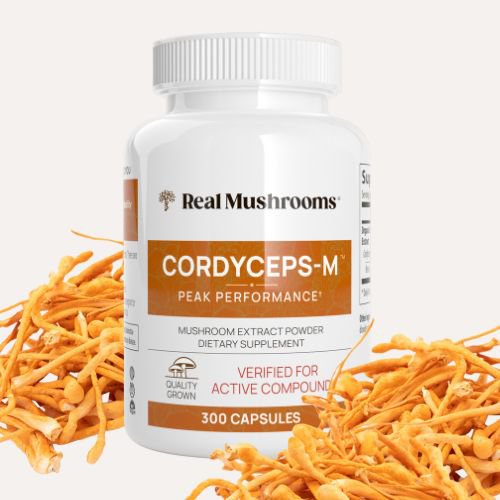

Functional mushrooms contain various bioactive compounds that contribute to their cognitive-enhancing properties. Some of the key compounds include:
Nootropic mushrooms work through various mechanisms that contribute to enhanced brain function and overall cognitive health.
These mushrooms contain bioactive compounds that interact with the brain and nervous system in several ways:
Certain compounds in nootropic mushrooms, such as hericenones and erinacines found in lion's mane mushroom, promote the growth and repair of neurons.
These compounds stimulate the production of nerve growth factor (NGF), which is essential for the maintenance, survival, and regeneration of neurons [7].
Nootropic mushrooms are rich in antioxidants, which help to combat oxidative stress in the brain. Oxidative stress is linked to cognitive decline and neurodegenerative diseases. By neutralizing free radicals, these antioxidants protect brain cells from damage [8].
Chronic inflammation in the brain is associated with various cognitive disorders. Based on several studies on mice, compounds like polysaccharides and triterpenoids in mushrooms such as reishi and chaga can help maintain a healthy inflammatory response and potentially lower the risk of cognitive decline [19,20].
Compounds in cordyceps (primarily, cordycepin) can increase the availability of adenosine triphosphate (ATP), an energy-storage molecule [9]. Since enhancing ATP production can have cognitive-enhancing effects [21], and overall anti-fatigue effects [22], cordyceps can be an ally for supporting focus and cognitive energy.
Some mushrooms, like cordyceps, improve blood flow and oxygenation in the body, including in the brain. This increased circulation ensures brain cells receive adequate nutrients and oxygen, essential for optimal cognitive function [10, 11].
Functional mushrooms can influence the levels of key neurotransmitters such as dopamine, serotonin, and acetylcholine.
For instance, lion's mane has been shown to increase acetylcholine levels, which are important for memory and learning. Similarly, Reishi can modulate serotonin levels, contributing to improved mood [23].
These mechanisms collectively contribute to the cognitive-enhancing effects of nootropic mushroom supplements, making them a natural option for supporting brain health.
Nootropic mushrooms are known for their potential to enhance cognitive function and overall brain health. Below are some of the key benefits associated with nootropic mushrooms:
Nootropic mushrooms are often praised for their ability to boost cognitive function. These include:
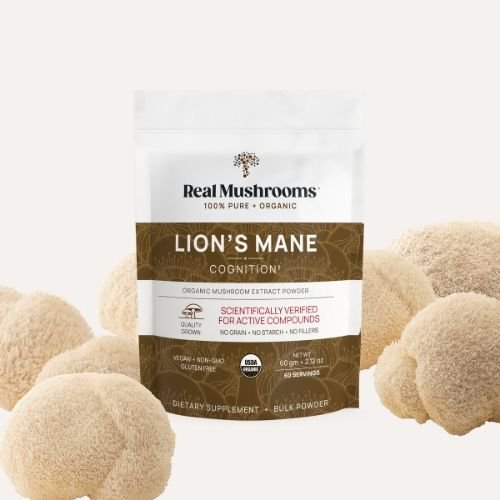
In addition to cognitive support, functional mushrooms may offer several mental health benefits:
Functional mushrooms may also offer protective benefits for the brain:
While primarily known for their cognitive and mental health benefits, functional mushrooms can also contribute to overall physical well-being:

Nootropic mushrooms have garnered significant interest in the scientific community due to their potential cognitive benefits. Various studies have been conducted to explore their efficacy and mechanisms of action.
Below are some key findings from the research:
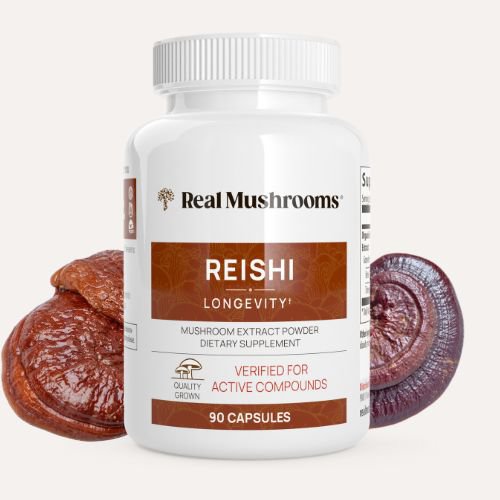
Overall, multiple studies indicate the potential of functional mushrooms to enhance cognitive function and be neuro-protective. However, further research, particularly large-scale human clinical trials, is necessary to fully understand their efficacy.
Functional mushrooms, while generally considered safe for most people, can have side effects that vary depending on the type of mushroom and the individual's health condition. Common side effects include gastrointestinal issues, allergic reactions, and potential interactions with other medications.
Here are some common side effects you may experience when taking mushroom supplements:
Some individuals may experience nausea, diarrhea, or stomach cramps after consuming nootropic mushrooms. These symptoms are usually mild and temporary.
Although rare, allergic reactions can occur. Symptoms may include itching, rash, or swelling, particularly in individuals with known mushroom allergies.
Some users report headaches, especially when first starting to use nootropic mushrooms or when taking higher doses.
Drug Interactions: Taking mushrooms can interact with medications such as blood thinners, immunosuppressants, and certain antidepressants. These interactions can either enhance or diminish the effects of the medications. Discuss with your medical care provider before begining to use nootropic mushrooms if you are pregnant or taking medications.
The long-term safety of taking functional mushrooms is a topic of ongoing research. Current studies suggest that many nootropic mushrooms, such as lion's mane (Hericium erinaceus) and reishi (Ganoderma lucidum), are generally safe for extended use when consumed in recommended dosages.
However, the long-term effects can vary depending on the specific type of mushroom and individual health conditions. Here are some variables that you should consider before you add mushroom supplements to your wellness regimen:
Certain populations should exercise caution when using functional mushrooms long-term:
While functional mushrooms appear to be safe for long-term use for most individuals, it is essential to consider individual health conditions and consult healthcare professionals to ensure safety and efficacy.
Several nootropic mushrooms are recognized for their cognitive-enhancing properties. The most effective ones include:
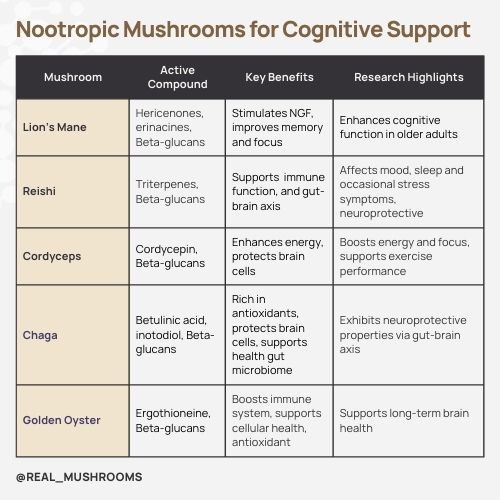
How To Take Functional Mushrooms: These mushrooms are often consumed in various forms, including powders, capsules, and tinctures. For those looking to enhance their cognitive function naturally, it’s important to take a high-quality supplement made from 100% mushrooms and not mycelium grown on grain.

Nootropic mushrooms can often be taken with other supplements or medications, but it is essential to consider potential interactions and consult with a healthcare provider before combining them. The interactions between functional mushrooms and other substances can vary based on the specific mushroom and the supplement or medication in question.
For those seeking to enhance cognitive function naturally, Real Mushrooms offers high-quality, 100% mushroom supplements you can trust. Mushrooms contains beta-glucans and polysaccharides, compounds known to support well-being. In contrast, many other supplements use mycelium grown on grain, and therefore have fewer medicinal compounds.
Real Mushrooms is committed to delivering supplements that are effective, pure, and true to nature. Focusing solely on the mushroom (fruiting body) ensures that our products provide the full benefits of nootropic mushrooms.
Whether you're looking to support memory, sharpen focus, or support overall brain health, Real Mushrooms has a supplement to meet your needs. Explore our wide selection of 100% organic mushroom supplements today and discover the difference that real quality makes.

As the new year unfolds, many of us are focused on setting and achieving personal goals. In the quest for improved well-being, mushrooms – both culinary varieties and functional extracts – emerge as unsung heroes. Their unique properties and health benefits align seamlessly with the top five resolutions of 2024, as outlined in Forbes' "New Year’s Resolutions Statistics 2024" article.
According to the Forbes 2023 survey of 1000 Americans, the following resolutions were the top 5 most common responses:
Let's delve deeper into the science behind how mushrooms can support these aspirations.
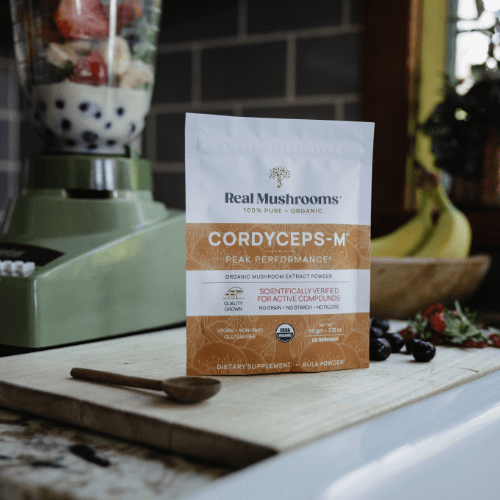
Cordyceps, a mushroom revered in traditional medicine, has garnered attention in the fitness world. Studies reveal that the cordyceps mushroom makes for an ideal pre- and post-workout supplement: It enhances aerobic capacity, delays fatigue, and improves endurance by influencing the body’s exercise utilization of oxygen and energy production [1]. This is attributed to its ability to increase adenosine triphosphate (ATP) levels, the primary energy currency of the cell, thus providing extra energy for longer, more intense workouts [2]. Moreover, as an adaptogen, a good quality cordyceps supplement can help the body manage and adapt to stress. These properties help promote better recovery post-exercise by balancing muscle inflammation and oxidative stress [3].
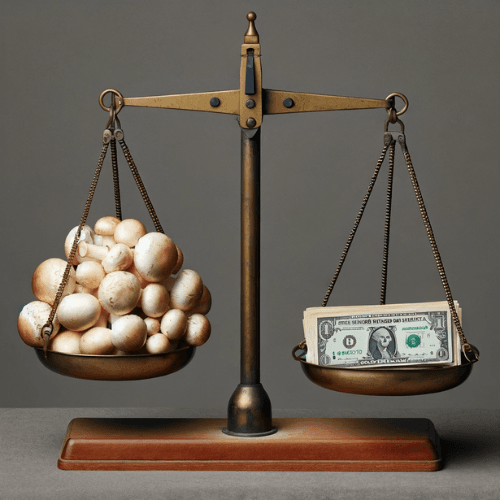
In the context of financial wellness, culinary mushrooms offer an economical and nutritious alternative to meat. Economically, they are less costly to produce and purchase, helping consumers save money without compromising nutritional value. Nutritionally, mushrooms are rich in proteins, vitamins (especially B vitamins), minerals (like selenium, potassium, and copper), and antioxidants [4]. This makes them a nutrient-dense food choice that provides essential nutrients without the high costs associated with meat. Incorporating mushrooms into your recipes can help stretch the food budget while contributing to a balanced diet.
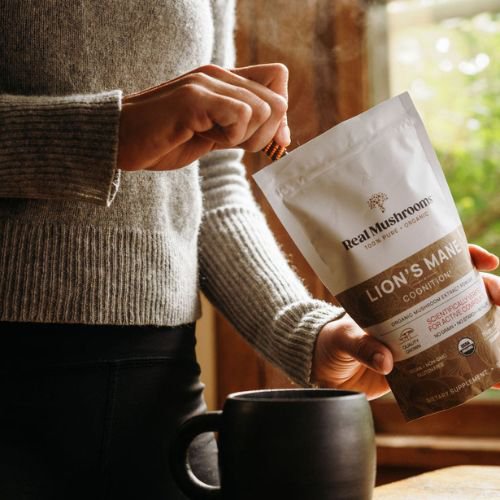
For mental health, reishi mushrooms and lion's mane are particularly noteworthy. Reishi, often termed as the "mushroom of immortality," is known for its calming properties. It contains triterpenes, which have been shown to induce sedation and decrease anxiety [7]. Studies suggest that a quality Reishi supplement can improve sleep quality by modulating the sleep-wake cycle, which is crucial for mental health and daily functioning [8].
Lion's mane has unique neuroprotective properties. It contains compounds like hericenones and erinacines that stimulate the growth of brain cells and can potentially improve cognitive function [5]. This mushroom has been linked to enhancing memory and brain function, which is crucial in the fast-paced, stress-inducing modern lifestyle [6]. A good quality lion’s mane supplement can be the key to enhancing your mental clarity.
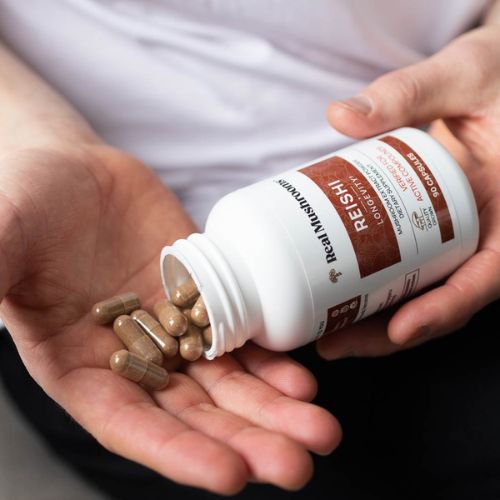
Mushrooms are a low-calorie, high-volume food, meaning they provide a lot of food with few calories, making them ideal for weight loss. Their high fiber content promotes satiety, reduces food intake, and aids in digestion. Some mushroom varieties, like Ganoderma lucidum (reishi), have been studied for their potential to manage obesity. These mushrooms contain bioactive compounds that can alter fat metabolism and regulate the expression of genes related to obesity [9].
As mentioned in section 4, Reishi can also improve sleep quality and promote a calm mood.
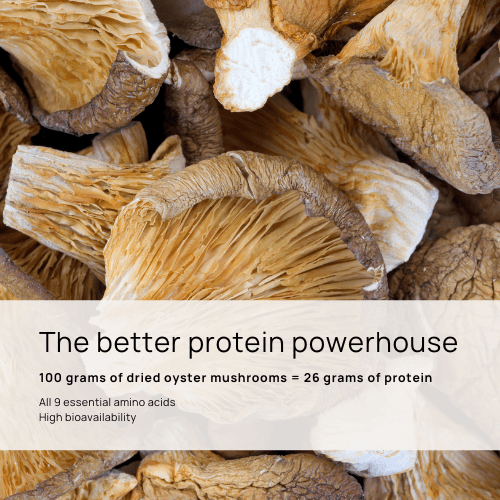
In terms of dietary improvements, mushrooms are an excellent source of several key nutrients. They are one of the few non-animal sources of vitamin D, essential for bone health and immune function [10]. They also contain B vitamins, vital for various metabolic processes, including energy production. Additionally, the antioxidants present in mushrooms, like ergothioneine and selenium, help combat oxidative stress and promote a healthy inflammation response, contributing to overall wellness and longevity [11].
In summary, mushrooms, in their various forms, stand as powerful allies in achieving the common New Year’s resolutions of 2024. They are not just a means to an end but a sustainable, health-promoting choice that benefits both personal well-being and financial health. Whether you’re looking to boost your fitness regime, manage finances wisely, support mental health, lose weight, or improve your diet, mushrooms offer a versatile and effective solution for your journey toward personal growth and wellness.

There is no denying it – reishi mushroom extracts are garnering huge interest among pet parents and veterinarians. They are multi-benefit additions to dog and cat diets and supplement protocols. But why are experienced veterinarians and pet carers turning to the reishi mushroom for dogs in particular?
When it comes to functional mushrooms for pets, the most popular one has been the turkey tail mushroom (Trametes versicolor). This interest has occurred in part because there are two compelling veterinary clinical studies that researched the impact of an extract from pure turkey tail mycelium on dog health.
There is another mushroom that rivals the turkey tail in the clinical study department, but it is on the “human” side. This highly-studied mushroom is Ganoderma lucidum, a.k.a. Reishi. Reishi (Lingzhi in Traditional Chinese Medicine) is a wonderful mushroom to consider for your dog, and possibly your cat. We will get to the “possibly your cat” explanation later on in this blog.
Reishi, often referred to as the “mushroom of immortality,” has been used in Traditional Chinese Medicine (TCM) to improve health and longevity for thousands of years. It is one of the most popular functional mushrooms in China, Japan, and Korea.
TCM practitioners have long prescribed reishi to influence the Heart, Lungs, Liver, and Kidney channels, balance Qi (the body’s life force), calm the mind, and relieve cough and asthma.
This reishi mushroom was and is revered in China, in particular, because of its multi-faceted and storied health-supporting properties, so much so that it is common to see reishi represented in ancient and modern art, literature, and architecture.
Reishi contains over 400 different beneficial compounds. These include triterpenoids, polysaccharides (including beta-glucans), nucleosides, sterols, steroids, fatty acids, proteins, peptides, and trace elements [1].
Many of these beneficial compounds are secondary metabolites. Secondary metabolites are natural products synthesized by bacteria, fungi, and plants. They are not essential for growth (in contrast to primary metabolites like chitin and beta-glucans), and many of these secondary metabolites have been used in the creation of drugs.
An example of this is Taxol, an antitumor agent derived from plant secondary metabolites [2, 3]. These secondary metabolites send complex messages to the cells that are primed to receive these signals. It is somewhat like the alphabet, where the more letters that are available, the more sentences can be written.
In Reishi's case, a triterpene called ganoderic acid is the secondary metabolite receiving the most attention and research. Some of the benefits of this reishi triterpene include antitumor, antimicrobial, anti-malaria, antihepatotoxic, and blood pressure reduction activity [4]. There are many more triterpenes in reishi in addition to ganoderic acid. These triterpenes work on their own to provide specific health benefits and act synergistically with the beta-glucans in the reishi mushroom.
These triterpenes are also what give Reishi its distinctive bitter taste. Reishi is definitely the most bitter of the popular functional reishi mushrooms. This bitterness is something to be aware of when considering using this reishi mushroom in our pet protocols. It is a rare dog or cat that doesn’t shy away from any taste. Bitter is often associated with something being poisonous, so animals instinctively shy away from bitter tastes [5]. Later in this blog, we will discuss some ways to “hide” the bitter taste so that reishi is more palatable for pets.
One of the more challenging aspects of working with reishi mushrooms is the lack of actual clinical data or studies related to veterinary medicine. There are very few studies focusing on dogs and, as far as I know, none on cats. It is for this reason that we have to turn to human clinical studies, to in vitro (test tube or petri dish) and in vivo (lab animal, usually rat or mouse) studies. We can also consider the evidence from the abundance of anecdotal feedback from pet parents touting the health benefits they are seeing when they add reishi mushrooms to their pets' lives.
Here are some of the health benefits that have compelled veterinarians and pet parents to begin using reishi mushrooms for dogs:
Let’s dive deeper into a few of these health benefits...
Reishi has a beneficial effect on the nervous system and may be helpful for anxious pets or during stressful situations like thunderstorms or fireworks.
TCM practitioners have long utilized reishi to help alleviate insomnia and anxiety and as a support for meditation. Mouse studies have shown reduced sleep latency and prolonged sleep duration with Reishi [6].
This is one reason Dr. Rob Silver added reishi to Real Mushrooms’ “Relax” pet chews: for its potential to be an excellent calming agent for dogs and cats. It is also a wonderful synergistic mushroom to lion’s mane, which is also in the “Relax” chews.
Overall, Reishi exhibits broad neuroprotective effects. Reishi should be considered in the case of animal neurodegenerative diseases and brain injury, Canine Cognitive Dysfunction, degenerative myelopathy, spinal cord injury, stroke, or epilepsy [7].
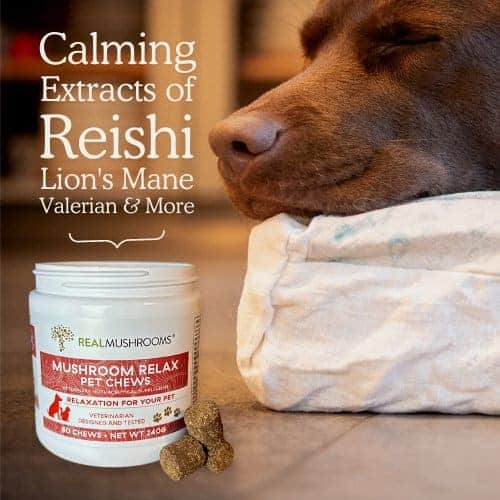
An exciting and promising use for reishi in veterinary medicine is in relation to allergies, asthma, and possibly mast cell cancer.
Dogs and cats with seasonal allergies may benefit from the immune-modulating and antihistamine activity of Reishi. Ganoderma (Reishi) helps to stabilize the mast cells to inhibit their release of histamine. Histamines are released by mast cells in reaction to allergens or pathogenic invaders. An overactive response—such as we find with allergies—can cause itching, runny nose, eye irritation, and redness of mucous membranes. In our pet population, this can look like excessive scratching/chewing, sneezing, wheezing, or runny discharge from the eyes or nose.
A 2010 study involving mice showed that the extract of G. lucidum can inhibit the release of histamine from mast cells in vitro, suggesting that G. lucidum extract has anti-allergic activity and could be effective against mast cell-mediated itch [8].
Martin Powell, a Traditional Chinese Medicine practitioner, biochemist, author, and mushroom expert, weighs in on administering reishi mushrooms for dogs with allergies:
“Ganoderma lucidum (reishi) as immunonutrition, with its unique array of compounds working in concert, could play a major role in current treatment practices for histamine-mediated allergic response. Ganoderma lucidum (reishi) is an effective agent to restore the normal balance between the TH1 and TH2 immune states in patients with histamine-mediated immune responses. Such an approach treats the underlying cause for the TH2 condition.” [9]
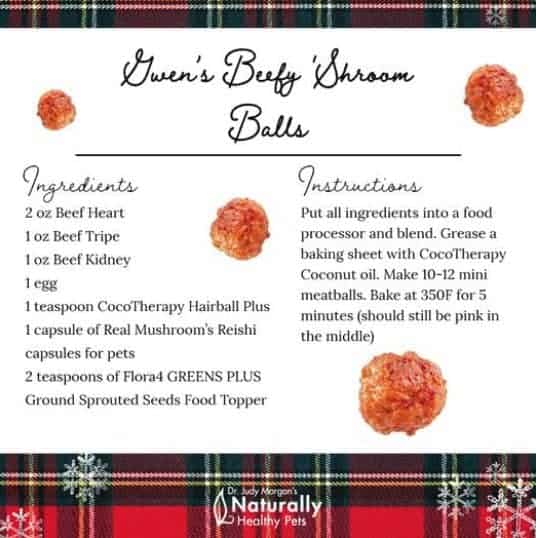
PubMed is an excellent free resource to explore clinical studies. When “Ganoderma and cancer” is entered into the PubMed search engine, 683 results are available. This is an indication of how much attention reishi is receiving when it comes to cancer research.
Reishi acts as a biological response modifier (BRM): it can modulate the immune response needed by the body. The reishi mushroom’s antioxidant properties and compounds can stimulate both the innate and adaptive immune systems. Reishi interacts in a positive way with natural killer (NK) cells, neutrophils, and macrophages, and stimulates cytokine expression and secretion.
A good example of this BRM activity is in relation to cancer. In general, Reishi triterpenes could directly suppress the growth and invasive behavior of cancer cells, whereas reishi polysaccharides, such as beta-glucans, could synergistically modulate immune anti-cancer activity. The result is the activation of Natural Killer T cells and the production of anti-neoplastic cytokines [6].
Reishi may be a good mushroom to consider if you have opted to have chemotherapy or radiation treatment for your pet. Radiation and chemotherapy can kill stem cells for red and white blood cells in the bone marrow. This results in anemia and a deficit of the important white cells needed to maintain health and freedom from infections.
Reishi can support animals undergoing cancer treatment by helping to protect their stem cells from the toxicity of chemotherapy or radiation therapy. An interesting study induced immunosuppression in mice and then treated them with a water-soluble extract from reishi. The researchers found the reishi-treated mice had increased red blood cells (RBCs), white blood cells (WBCs), NK T cells, splenic NK cells, and a number of bone marrow cells [10].
Additionally, reishi has the potential to enhance the effects of chemotherapy by increasing the dose of a chemotherapeutic agent that accumulates within a cell. A study using Ganoderic acid, the triterpene mentioned earlier, found it enhanced the accumulation of the chemotherapeutic agent cisplatin in tumor cells [10].
DO remember that not all mushrooms are the same. These are all either human, in vitro, or in vivo studies. There are currently no clinical studies of reishi in veterinary medicine. Regardless, if I had a dog or cat that was dealing with cancer, I would definitely consider adding reishi extract to the protocol along with turkey tail mushroom extract. This can be done by using these single mushrooms alone or by utilizing our 5 Defenders(™) mushroom extract complex for pets that contains reishi, turkey tail, shiitake, maitake, and chaga.
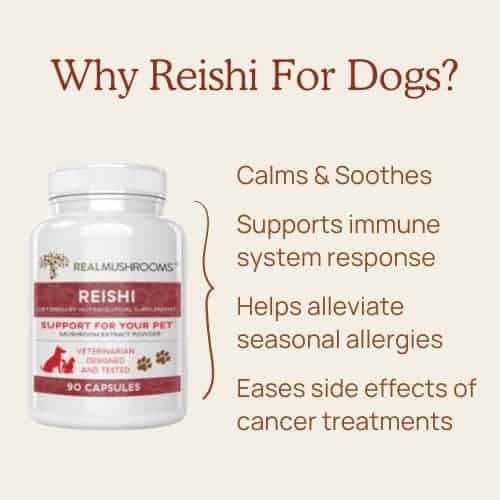
Unlike some of the other therapeutic mushrooms, reishi is not a culinary mushroom. It needs to be given as a natural supplement because it is too tough and leathery to be eaten as food.
It’s also important to remember that reishi is very bitter. The easiest way to administer the reishi is either in capsule form or as a pet chew. Dr. Rob Silver, Real Mushrooms Chief Veterinary Officer and product formulator, created 2 wonderful Real Mushrooms pet chews containing reishi! Our Relax chews for pets are calming and our Immune chews are for supporting the dog’s immune system.
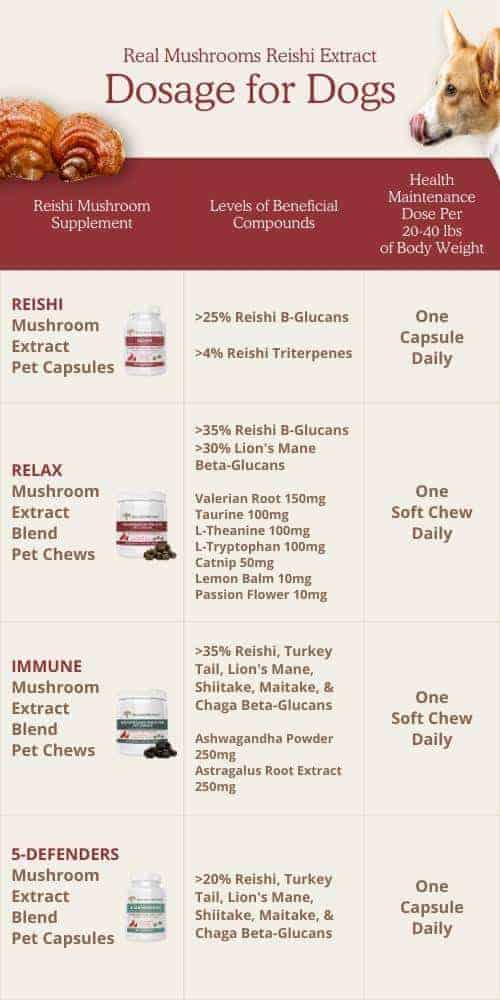
There are some cats that will accept being given the reishi capsules, and quite a few enjoy the pet chews. However, do be aware that it could be difficult to get Reishi into a very finicky cat, because of its bitterness. Milder-tasting mushrooms like lions mane or cordyceps might be the better choice for the picky kitty.
Finally, do your homework when purchasing reishi mushrooms in the supplement marketplace.
According to a 2017 study published in the journal Scientific Reports, 74% of Reishi products did not live up to the package claims.
Before purchasing reishi mushroom supplements, or any supplement for that matter, it is highly recommended that you do some research. Know what to look for in a good quality reishi mushroom supplement.
Here is some good information on what to look for in a reishi product: How to I.D. the Best Reishi Mushroom Supplement.
Do reach out to the Real Mushrooms Pet team if you have any questions about buying and using an extract of reishi mushroom for dogs:
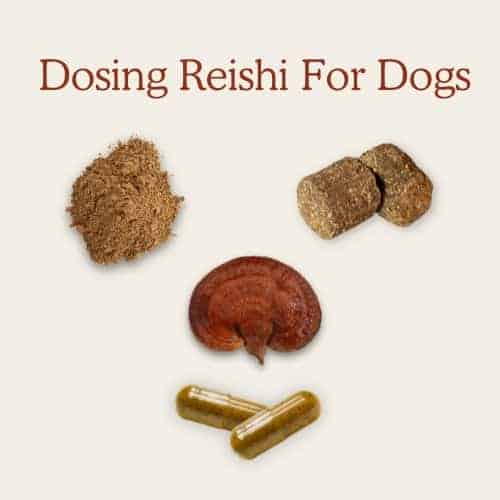

1) Zhou, L.-W. et al. 2015. ‘Global diversity of the Ganoderma lucidum complex (Ganodermataceae, polyporales) inferred from morphology and multilocus phylogeny’, Phytochemistry, 114, pp. 7–15. doi: 10.1016/j.phytochem.2014.09.023.
2) S. Sanchez, A.L. Demain. 2014. Secondary Metabolite - an overview.
3) https://www.sciencedirect.com/topics/agricultural-and-biological-sciences/secondary-metabolite
4) https://www.scirp.org/journal/paperinformation.aspx?paperid=99724
5) https://academic.oup.com/emph/article/9/1/431/6395358
6) Xia Feng, Yan Wang. April 30, 2019. Anti-inflammatory, anti-nociceptive and sedative-hypnotic activities of lucidone D extracted from Ganoderma lucidum. https://pubmed.ncbi.nlm.nih.gov/31078150/
7) Xiangyu Cui, Yonghe Zhang. 2019. Neuropharmacological Effect and Clinical Applications of Ganoderma (Lingzhi). https://pubmed.ncbi.nlm.nih.gov/31777017/
8) Inhibitory Effects of the Methanol Extract of Ganoderma lucidum on Mosquito Allergy–Induced Itch-Associated Responses in Mice111123 Tsugunobu Andoh , Qun Zhang , Takumi Yamamoto , Manabu Tayama , Masao Hattori , Ken Tanaka ,and Yasushi Kuraishi. DOI: 10.1254/jphs.10180fp
9) https://www.mycologyresearch.com/articles/view/28?utm_campaign=PNL%2020%20%28T8qGiB%29&utm_medium=email&utm_source=Practitioner%3A%20Newsletter%20Sequence&_kx=bL9S6QskVAqy0hm7niluqiuPq-JYxdvNxQCw9GnYr4k%3D.L3MBgQ
10) Sanem Bulam, N Şule Üstün, Aysun Peksen. April, 2019. Health Benefits of Ganoderma lucidum as a Medicinal Mushroom. https://www.researchgate.net/publication/335032099_Health_Benefits_of_Ganoderma_lucidum_as_a_Medicinal_Mushroom
11) Evaluation on quality consistency of Ganoderma lucidum dietary supplements collected in the United States https://www.nature.com/articles/s41598-017-06336-3 Ding-Tao Wu, Yong Deng, Ling-Xiao Chen, Jing Zhao, Anton Bzhelyansky & Shao-Ping
Reishi (Ganoderma sessile), also known as the "mushroom of immortality" or "herb of spiritual potency," is a functional mushroom from the Ganoderma species revered for its scarcity and unique health benefits. In nature, there are no toxic reishi species lookalikes, but on the market, there are indeed supplements that can be confused as being made from real reishi when they’re not.
Unfortunately, a recent study conducted by the US Pharmacopeia (USP) and Nature found that only 26% of reishi mushrooms as supplements on the market today contain the bioactive components unique to reishi [1]. This means it's easy to purchase low-quality reishi mushrooms inadvertently.
Harvesting reishi mushrooms can be challenging due to their scarcity, and they are expensive to cultivate. Therefore, many manufacturers use reishi mycelium (the root structure of mushrooms), or other types of mushrooms altogether in their reishi supplement lookalikes.
Today, we want to help you identify authentic Ganoderma sessile or reishi mushrooms from diluted or fake lookalikes to ensure proper reishi mushroom identification.
Reishi mushrooms have numerous health benefits. They can:
When foraging reishi mushrooms, it’s essential to ensure that they have matured properly to capture their full range of benefits. Reishi species is the “King of Mushrooms” because of its wide applications in health maintenance and its complex of unique compounds.
Key to reishi’s power as a natural health booster is its beta-glucans and triterpenes. These compounds become key indicators of the quality of the supplement you are considering buying, as we will discuss below.
The following list of 4 characteristics will help you identify a true, quality reishi supplement from weak or fake lookalikes.

Although reishi mushrooms grow with a subtly sweet aroma reminiscent of cocoa, they have a strong earthy, bitter taste.
The bitter taste is a quality indicator that signifies the availability of beneficial polysaccharides called triterpenes. Therefore, you can leverage this to tell whether your supplements are authentic.
Triterpenes, specifically ganoderic acids, are behind the bitter flavor of reishi. Reishi mushrooms mature fully in nature with these beneficial compounds intact. Hemlock reishi is known to have a particularly bitter taste, which is why it’s highly valued. Reishi is the only source of ganoderic acids. These acids are active polysaccharides with a molecular structure similar to steroid hormones [2].
The absence of the bitter flavor in your supplements means you’ll miss out on the following benefits offered by triterpenoids:
When purchasing reishi mushrooms as supplements, whether in powder or extract form, check the product label for an analysis of the amount of triterpenoids in the product.
Expert Tip: The potency of reishi supplements is partly based on the level of triterpenoids, which you can determine simply by tasting. The more bitter your reishi tea or capsule, the higher the quality and levels of beneficial triterpenoids.
Beta-d-glucans are the primary source of health benefits in functional mushrooms. They are long chains of sugar molecules that compose the cell walls of mushrooms, and they activate innate and adaptive immunity.
Beta-d-glucans are at the top of the list of active beneficial compounds in mushroom extracts, as they help to support immune defense.
The product label must indicate the percentage of beta-d-glucans. This data is necessary because the levels of beta-d-glucans in mushroom products suggest its potency.
If a reishi mushroom extract lacks beta-d-glucans, you can best believe that it also lacks other compounds, such as amino acids, vitamins, and minerals, which are typically not measured.
At Real Mushrooms, we offer high-quality mushroom extracts from 100% pure organic mushrooms produced without any grain, fillers, or additives. Our reishi mushroom supplements provide you with all the benefits of the “mushroom of immortality” and have the individual beta-d-glucan content indicated on the product labels.
The following table highlights all our reishi supplements and reishi mushroom blends, the percentage of beta-d-glucans in each, and the amounts of other beneficial active compounds.
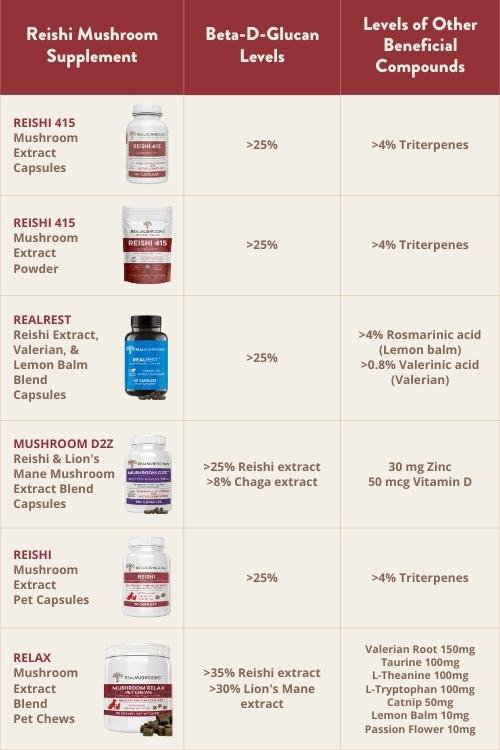
Unlike most supplement manufacturers, we boldly list the active compounds and ingredients in our mushroom extract products.
Extracts made from the mushroom (fruiting body), as opposed to the mycelium (root structure), will have high levels of beta-d-glucans.
Mycelium-based supplements have very high levels of alpha-glucans (filler starches like glycogen cellulose) and low levels of beta-d-glucans.
Therefore, you need to ensure the product indicates that the reishi mushrooms (fruiting body) are used and not mycelium if you want to enjoy all the health benefits of this fungus.
Since 1976, the American Food and Drug Administration has a regulation regarding mycelium products:
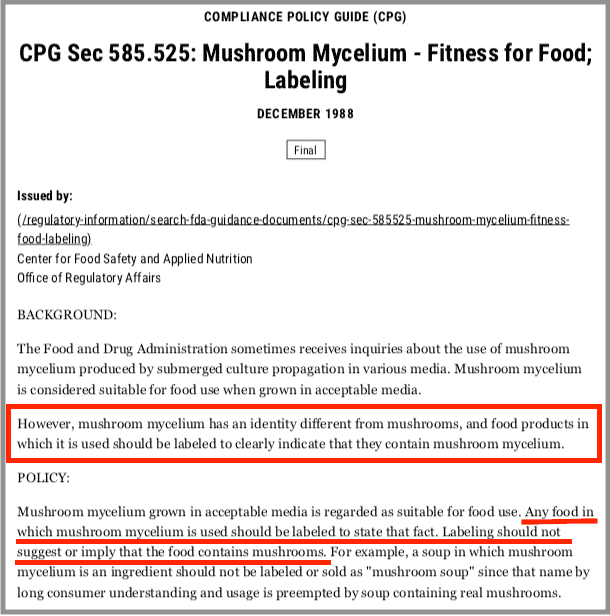
Mycelium-based products are reishi mushroom lookalikes with misleading marketing. Always look at the product ingredient label and make sure that it is explicit about whether the extract contains chopped reishi mushrooms (sometimes labeled as “fruiting body”) or reishi mycelium.

Unbeknownst to many supplement consumers, polysaccharide content is not an indicator of quality in mushroom extracts. In fact, it can indicate a poor-quality mushroom product.
Polysaccharides can include both alpha-glucans and beta-glucans. Beta-glucans are the desirable health-supporting polysaccharides in reishi mushrooms. Whereas, alpha-glucans are polysaccharides that derive from starches.
It’s not uncommon to find supplements boasting high polysaccharide content. However, in truth, they feature low beta-d-glucans and high levels of alpha-glucans.
Such supplements are posing as reishi mushrooms, but they are just myceliated grain pumped with useless starches. Fillers from myceliated grain dilute the active compounds in your mushroom product.
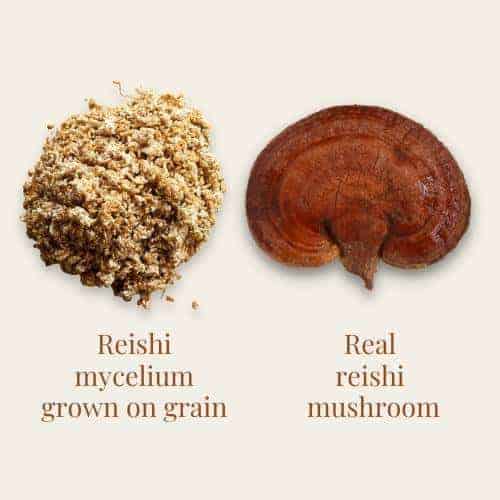
So, what should be measured instead of total polysaccharide content? The beta-d-glucan percentage shows the amount of beneficial fungal compounds in the extracts.
Buyer Tip: Many reishi mushroom lookalikes say “mushroom extract” or “mushroom supplement” on the label. However, they will actually only contain mycelium grown on grain and no mushrooms at all. These products will often boast a high polysaccharide content without indicating true beta-glucan content. So, make sure the beta-glucan and triterpenoid levels are listed on the product label.
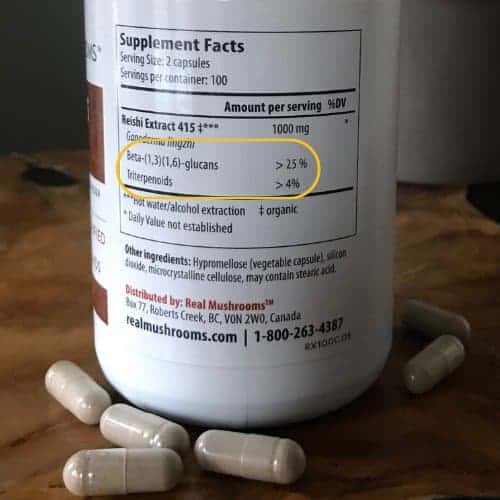
A third party should evaluate reishi mushroom supplements for authenticity, sourcing, and potency. These evaluations determine whether the supplements are extracted from high-quality, health-promoting reishi mushrooms in their purest form.
Third-party labs need to ascertain the potency based on the levels of beta-d-glucans in the product and the ingredients used (true reishi instead of other types of mushrooms).
For instance, Real Mushrooms’ Organic Reishi 415 Mushroom Capsules were evaluated by ConsumerLab alongside 6 other reishi supplements. Believe it or not, Real Mushrooms’ Reishi extract came in first place thanks to the high amounts of beta-d-glucan and ganoderic acid concentration, high purity levels, and exclusive mushroom (fruiting body) content.
In addition, our supplements:
It’s time to end your search for the best reishi mushrooms. Real Mushrooms has exactly what you need to help you support your immune system, longevity, sleep, and state of mind: Organic Reishi Mushroom Capsules and 100% Organic Reishi Mushroom Powder.
Like many of our other clients, you’ll love our supplements for their wholesome benefits that are obtained from 100% real mushrooms sourced from organic farms in China. This means the foundation of our supplements is as sustainable as nature intended.
“I started using reishi as a form of health maintenance ... I have been using Real Mushrooms’ reishi for 5 years now. Real Mushrooms reishi is what I buy because I feel theirs is the most potent.” - Paul
“I take the reishi capsules every evening, a couple of hours before going to bed. I have found that it helps me wind down and makes it easier to fall and stay asleep.” - Jon
Not only can you trust Real Mushrooms reishi products for your own health, but your pets’ health also!
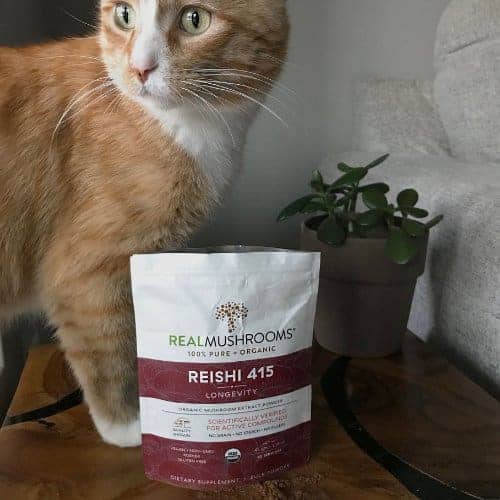

What would we do without our furry friends?
Those gentle snuggles after a stressful Monday and giant welcome-back hugs at the airport make life all the better.
Simply put, pets are family. This is why we’re always looking to keep them healthy, and mushroom extracts are a versatile way to do that.
Unfortunately, not all mushroom supplements work. Some contain diluting fillers that limit their bioactive compounds and functional benefits.
To help you pick the best mushrooms for dogs and cats, we’ve gathered information about three types of mushroom extracts: Turkey Tail, Reishi, and Lion’s Mane. As we go over their features, you’ll learn:
But first, let’s look at the different types of mushroom supplements and their uses.
There are various options for mushroom supplements with different bioactive compounds and benefits.
However, all medicinal mushrooms contain beta-glucans that can stimulate your pet’s immune system.
The following table highlights three mushroom supplements and the various needs they support:
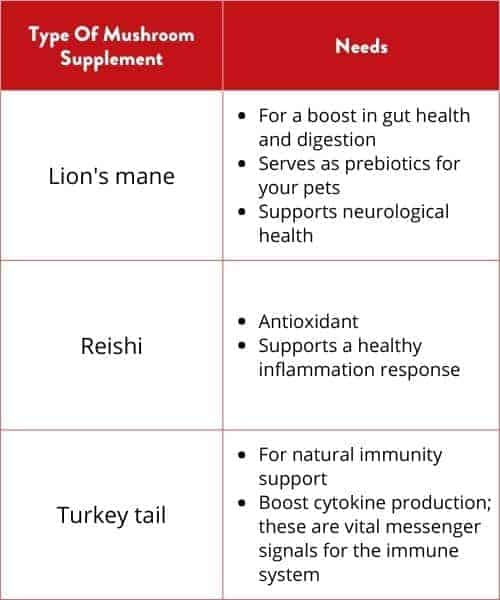
Let's delve into these mushroom supplements and their features.
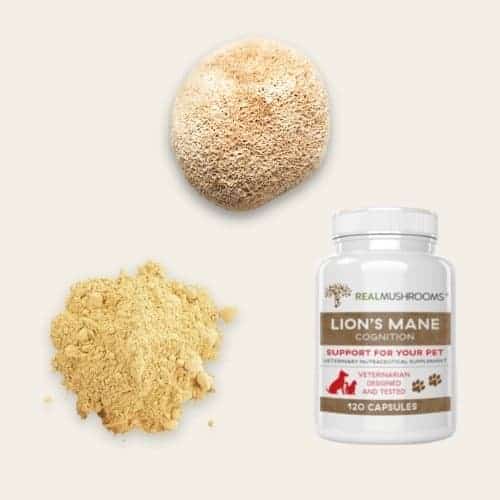
Lion’s Mane Extract from Real Mushrooms is produced using hot water to break down the fibrous cell walls and release this mushroom's bioactive molecules.
This method is called hot water extraction and results in concentrated levels of beta-glucans, which have important immune health benefits. Beta-glucans help train your pet's immune health to be vigilant and defend against possible challenges, among other benefits.
To get an idea of how pet owners have been using Lion’s Mane for their furry loved ones, read their reviews and latest prices:
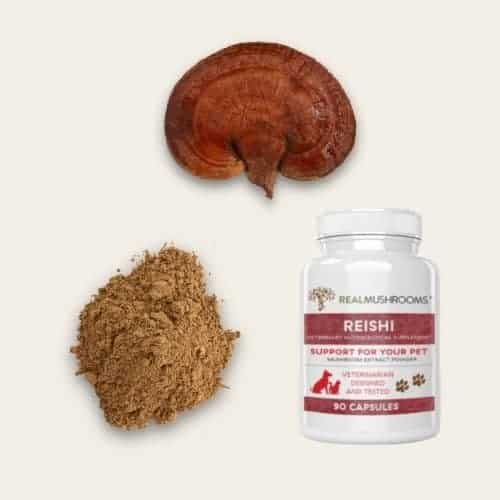
Reishi Capsules from Real Mushrooms are produced using hot water and alcohol. The hot water extracts the water-soluble compounds of Reishi mushrooms while the alcohol pulls out the water-insoluble components.
This procedure leads to a wholesome supplement with various bio-actives, from immune-boosting beta-glucans to triterpenes that promote a healthy inflammation response in your furry one.
For instance, Reishi Capsules have triterpenes (defensive compounds) such as ganoderic acids, which are non-water soluble and best extracted using alcohol.
The Reishi Capsules give you additional active ingredients, but if you want to learn more, read their reviews and latest prices.
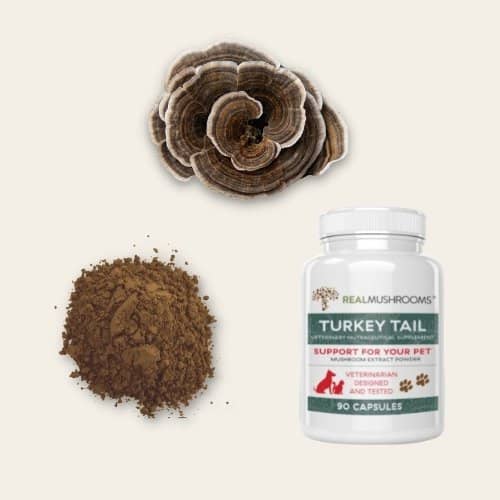
Similar to Lion’s Mane, Turkey Tail Extract by Real Mushrooms is also produced by hot water extraction.
This process keeps beta-glucan levels high (at over 30%). Turkey tail is the subject of more scientific studies than any other functional mushroom. Time and again it has shown its effectiveness in supporting the immune system, even among animals.
You’ll get more beta-glucans with Turkey Tail Extract, but if you want to learn more, check out the reviews and latest prices.
Mushroom supplements such as Lion’s Mane Extract can enhance your pet’s gut health. They contain oligosaccharides, which are natural carbohydrates that act as prebiotics (food for the good bacteria in your pet’s gut).
One study confirmed this fact when it concluded that feeding oligosaccharides to companion animals improved their microbial ecology and stool quality [1].
There are also human clinical studies showing Lion’s Mane can be highly beneficial in relation to gastrointestinal issues, and ulcers [2,3,4].
Mushroom supplements such as Turkey Tail Extract support your pet’s immune system by boosting the production of cytokine and T cells (one of the primary lymphocyte cells that form the immune response).
These supplements contain polysaccharide-Krestin (PSK), a compound that one study found to support T cell production.
Holistic vets like Dr. Rob Silver DVM, and Dr. Donna Kelleher DVM recommend Lion’s Mane extract for slowing the progress of neuro-degenerative ailments in dogs and cats such as Degenerative Myelopathy (a.k.a. Dog Lou Gehrig’s Disease) and Canine Cognitive Dysfunction (a.k.a. Dog dementia).
Using Lion’s Mane extract as a natural solution for pet neurological support is based on human and animal studies that have demonstrated the positive effects of this mushroom on protecting cognitive function, stimulating nerve growth, and even helping regenerate damaged nerves [5,6,7,8,9].
Giving your dog or cat a Lion’s Mane supplement is also a good preventative step for protecting their cognition and supporting healthy brain function as they age. Reishi is also useful as a stellar source of antioxidants for keeping neurons healthy as pets age.

The best mushroom supplements feature various bio-actives with different health benefits, but they also share some features and advantages—for instance, they use the mushroom itself, not mycelium or fillers, and they have high beta-d-glucans content.
Here’s a deeper look at these features and their advantages.
For these fungal organisms, the mushroom, sometimes referred to as the fruiting body, is just one stage in its life cycle. It’s what you see growing above the ground and what you are buying in the supermarket. However, many so-called mushroom supplements sold in North America do not have mushrooms in them at all!
Instead, these companies use the root system of the mushroom, which is called the mycelium. Why? Because it is far more economical to produce mycelium than to grow mushrooms in full.
Mycelium for supplements is typically grown in a grain-based substrate (the medium the mycelium grows on). When harvesting the mycelium, the grain is not separated from the mycelium and goes straight into the final product. This grain is just filler and provides no health benefits.
Between the grain-based filler and the lack of mushrooms, many supplements contain low concentrations of beneficial compounds from fungi, and high concentrations of starch.
We provide a detailed breakdown of the key differences between the mushroom (fruiting body) and the mycelium (vegetative body) in our article Functional Mushroom Benefits: Mycelium vs Fruiting Body.
Top mushroom supplements are processed without mycelium, chemical additives or preservatives. They use only the mushroom.
Here’s an example of a label from Real Mushrooms that clearly indicates the product is made of 100% mushrooms, not mycelium, and with no added fillers or starches of any kind (green arrow).
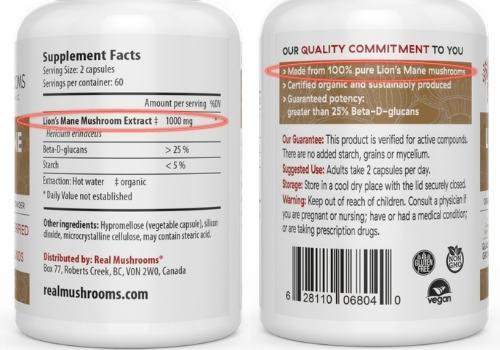
These are common polysaccharides (carbohydrate arrangements) found within the cell walls of mushrooms and in supplements.
Beta-d-glucans serve your pet by turning the immune system up or down (immunomodulation), among other health benefits, but this effect isn’t consistent across all mushroom species and supplements.
Immunomodulation depends on factors such as:
Expert Tip: Check the label on your mushroom supplement before purchasing to ensure you’re getting the highest quality. The best manufacturers document the levels of bio-actives present in their products.
The most common talking points on mushroom supplements for pets among users were regarding:
"My dog has been taking Turkey Tail for three weeks and I see a dramatic improvement in her energy level." Ellie, Turkey Tail Reviewer
"My dog is almost 17 and I am excited to find a supplement that has taken years off his age." Stacy, Lion’s Mane Reviewer
"My senior foster is very unsettled at certain times of the day. These chews help her relax and settle down." Beth H, Mushroom Relax Pet Chews Reviewer
Yes, you can. In essence, mushroom supplements are functional foods and work best when combined with a balanced diet.
This timeline is variable, but mushroom supplements like Reishi and Lion’s Mane can take effect after 2–3 weeks of daily use.
Most mushroom extracts can be taken once a day and still be effective. Check the labeling on your supplement to confirm the recommended dosage.
Some of the functional mushrooms are too tough to be edible (i.e., reishi and turkey tail). Also, mushroom supplements are made with an extraction process that makes the natural compounds within the mushroom more accessible to your pet’s body.
Otherwise, these valuable compounds would remain trapped behind chitin fungal walls—the same tough substance that makes up crustacean shells—and undigested.
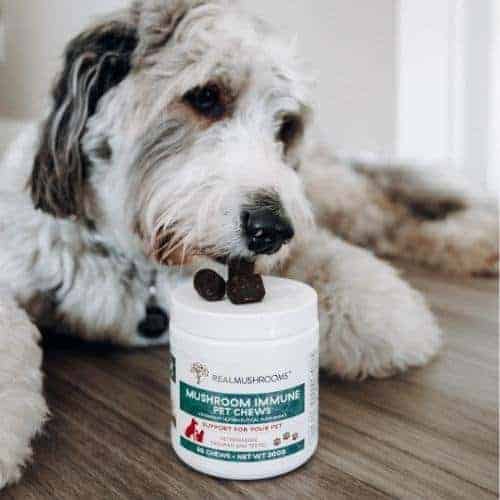
So there you have it—three needs uncovered by three types of mushroom supplements: Lion’s Mane, Reishi, and Turkey Tail.
Whichever option you choose, consider the following:
At Real Mushrooms, our goal is simple: to offer high-quality supplements from actual mushrooms. This stems from the industry problem of diluted supplements.
A recent study of mushroom supplements found that 74% of Reishi products are inauthentic. Most contain diluting fillers such as grain and mycelium.
Dilution causes higher concentrations of alpha glucans and lower levels of crucial beta-glucans. As such, these supplements offer little value to your pets.
Real Mushrooms supplements are made solely from mushrooms (the fruiting body). This reality is why we list the scientifically verified ingredients and active compounds on our products. unlike most companies.
We also offer cordyceps mushrooms, another functional mushroom that may help regulate oxygen flow and energy levels for humans and pets. Cordyceps mushrooms are gaining recognition for their potential to boost endurance and promote active movement in animals.

Deemed “The King of Mushrooms,” reishi mushroom (Ganoderma lucidum or lingzhi) is living up to its name.
It’s been shown to have many effects that are uncommon in other functional mushrooms, such as alleviating occasional stress. This is just one of the many reasons that drinking reishi mushroom tea is beneficial for health maintenance.
So, what really makes this mushroom special?
Let’s take a journey back in the history of reishi as a component of traditional medicine practices:
Ancient Chinese herbalists called reishi Lingzhi (灵芝) because it means “herb of spiritual potency.” It was revered by Chinese emperors because of its scarcity and reputation for being one of the most celebrated herbs in the Chinese “bible” of medicinal plants: Shennong Ben Cao Jing (a.k.a. Materia Medica).
Of reishi, the author writes, “If eaten customarily, it makes your body light and young, lengthens your life, and turns you into one like the immortal who never dies.”
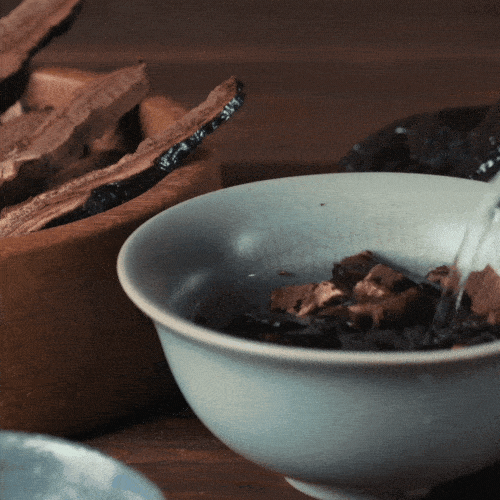
For thousands of years, reishi has been used as a functional and therapeutical solution throughout Asia for various problems such as:
Luckily, you can now enjoy these benefits more conveniently through our Reishi Mushroom Powder, which you can use to make your own reishi tea.
Instead of simply trusting reishi’s roots, modern research into the effects of reishi can help us determine how it can improve a person’s health and wellness. Recent studies that we share below have also discovered new benefits of reishi mushrooms, making reishi mushroom tea
Skin aging and deterioration intrinsically occur when the production of certain hormones, like estradiol and testosterone, decreases. Extrinsically, overexposure to solar radiation may lead to sun damage, causing premature aging [1].
These issues often lead to symptoms such as skin dryness, hyperpigmentation, collagen degradation, and wrinkle formation. Because these issues can’t be avoided, cosmetic companies are constantly searching for natural compounds and extracts that will help delay the aging process.
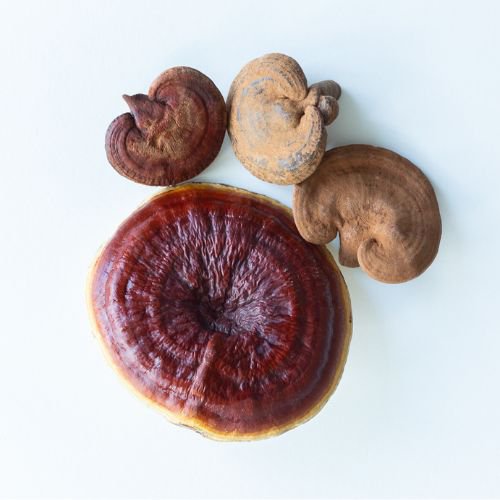
Thanks to its antioxidant properties, the reishi mushroom recently found its way into the skincare industry as a functional cosmetic ingredient.
Ganoderma lucidum can help reduce wrinkles and fine lines and neutralize free radicals in the body, which damage healthy skin cells and create oxidative stress [2].
Reishi mushroom (Ganoderma lucidum) also contains beta-glucans—the long chains of sugar molecules that help to promote the skin’s ability to store water—keeping the skin hydrated from within.
What Are Beta-Glucans? Beta-glucans are soluble fibers from plants, fungi, yeasts, and certain bacteria. They help fight diseases by activating innate immune cells, boosting immune system response and improving overall well-being.
The table below outlines the specific properties of reishi (Ganoderma lucidum) that make its tea great for the skin [3].
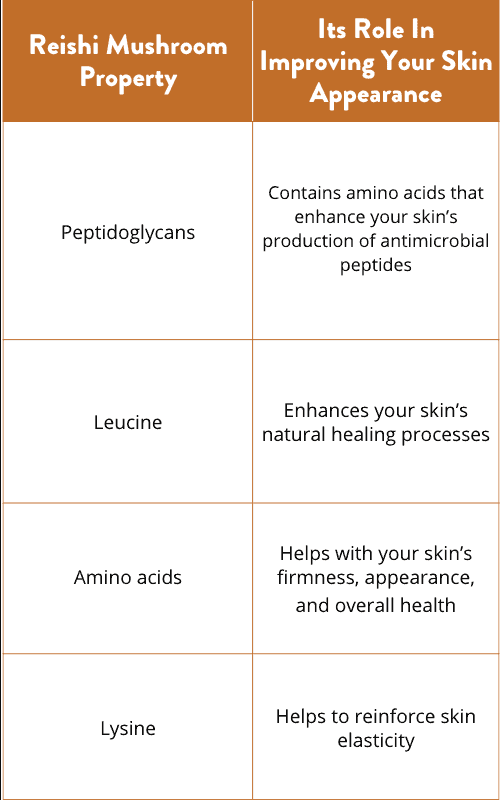
The Institute of Food Technologists describes functional foods as those whose ingredients provide added benefits beyond their basic nutritional value [4].
Historically, people consumed the reishi mushroom because of its nutritional and medicinal benefits. This historical claim has led to a recent research project exploring reishi’s bioactive components and therapeutic values [5].
The study revealed that the reishi mushroom (Ganoderma lucidum) contains water-soluble proteins, dietary fiber, minerals (such as sulfur and phosphorus), and vitamins (including riboflavin and thiamin), all of which contribute to its nutritional benefits.
Additionally, reishi’s bioactive components, including alkaloids and polysaccharides like beta-glucans, polyphenols, terpenoids, sterols, and lactones, are known to help promote therapeutic effects like supporting cognitive functions and alleviating occasional stress.
Reishi mushroom (Ganoderma lucidum) has also been associated with numerous health benefits, including [6] [11] [12]:
These benefits combined make the reishi mushroom (Ganoderma lucidum) a functional food with positive effects on the body, increasing the value of drinking reishi tea to improve wellness.
The quality of products containing reishi mushroom extracts affects its potency. Note that one study found that 74% of reishi products are not authentic, and this calls for extreme keenness when making your purchase.
Fortunately, Real Mushrooms offers the highest-quality mushroom extracts produced in their purest form, without any fillers, carriers, or additives.
So, for any purchase you make, you’re certain to receive all the potential benefits that reishi mushrooms have to offer.
"... I was blown away by how effective it is at reducing anxiety, racing night thoughts and insomnia." HikerMom13, Verified Real Mushroom's Reishi Mushroom Extract Buyer
Collagen, the body’s most abundant protein, plays a critical role in the wound repair process. How fast a wound heals depends on collagen's production, accumulation, and maturation in the wounded area.
Collagen accumulation significantly depends on the presence of hydroxyproline. A higher hydroxyproline concentration means higher collagen production, leading to faster healing.
Results from a recent study indicated that reishi mushroom aids in activating the concentration of hydroxyproline and hexosamine [7]. Both hydroxyproline and hexosamine give strength to repaired tissues and in turn help to activate the wound healing process.
Another study reported similar results, attributing reishi’s role in activating wound healing to its high polysaccharide content [8].
Natural polysaccharides have previously been linked to faster wound healing as they help to facilitate the activation of the immune system. It’s believed that this process results from the ability of reishi polysaccharides to help activate macrophages, one of the major inflammatory cells in the body that clean up the wound site after injury [9].
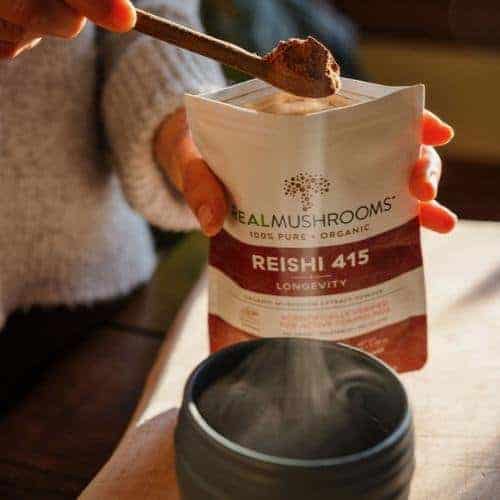
Eating the mushroom in its raw form is unpleasant because its texture is so tough and leathery. However, you can still enjoy all of its benefits by adding an extract of this mushroom to hot water to make reishi tea.
Adding either dried reishi filtered to make tea bags or reishi powder directly into the hot water will add a subtle earthy flavor.
Instead of using a full tea bag to create tea, you can use one tablespoon of reishi mushroom powder added to a cup filled with boiling water.
The bitter mushroom taste won’t be as pronounced if you add your usual tea regimen. For example, you can mix in one tablespoon of reishi mushroom powder into jasmine tea.
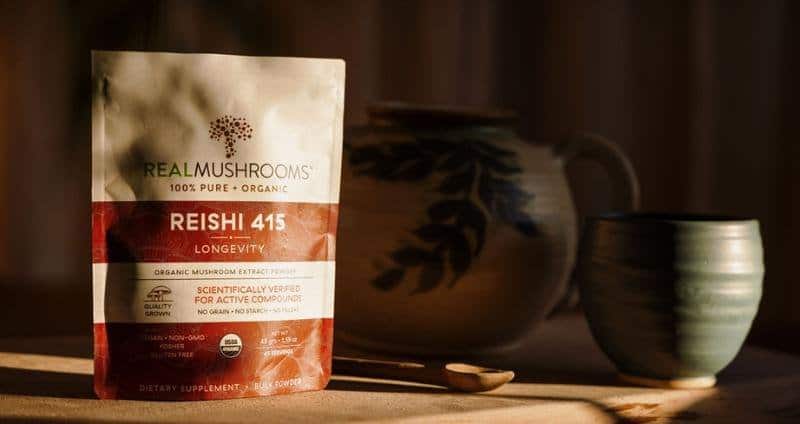
A poor diet, hormonal changes and medical conditions can all contribute to hair loss.
Male pattern baldness, for instance, is one of the major reasons for hair loss in men. It occurs when testosterone is converted into dihydrotestosterone (DHT) by the enzyme 5α-reductase. DHT then sticks to the hair follicles in your head and kills them through miniaturization.
Fortunately, reishi mushrooms have recently been found to have several health benefits for hair.
Men with male pattern baldness have scalps that are sensitive to DHT. Luckily, it’s possible to inhibit DHT production and reduce hair loss thanks to the benefits of reishi mushrooms.
A recent study suggests that the reishi mushroom is a great inhibitor of 5α-reductase, which helps to lower the amount of DHT produced in the body [10]. This, in turn, reduces DHT levels on the scalp, protecting the hair follicles from miniaturization.
Reishi mushrooms are also rich in antioxidants, which may help shield the scalp from toxins and damage from free radicals. Less damage results in a healthier scalp and a conducive environment for regenerating hair follicles, bringing forth thicker, stronger hair.
Antioxidants and Hair Growth: Besides promoting healthy blood pressure, antioxidants from functional mushrooms such as reishi also protect the cuticles from sun damage.
Reishi mushrooms are well-known as antioxidant powerhouses that support a healthy inflammation response.
They help to improve blood circulation, allowing the smooth flow of nutrients and oxygen into the scalp. This promotes the growth of healthy hair and reduces the chances of scalp conditions, such as dandruff and psoriasis.
Reishi mushrooms help retain your hair’s sheen and vibrant hue for longer, preventing premature or age-related graying [5].
Also, as a strong antioxidant, reishi mushroom helps lower normal oxidative stress, allowing your hair to remain strong and retain its color.
You can drink your mushroom tea at any time throughout the day. To achieve the optimal amount of reishi mushroom benefits, ensure you take it consistently.
We recommend adding a half teaspoon of Organic Reishi Mushroom Powder to your tea twice a day—one cup in the morning and another cup in the evening.
Because the reishi mushroom can help regulate your digestive health, it’s a great supplement to start the day with.
It may also promote relaxation, thanks to its mood-lifting properties, making it the perfect addition to your evening routine as you wind down after a long day. Many people take reishi tea before bed and report having an easier time falling asleep.
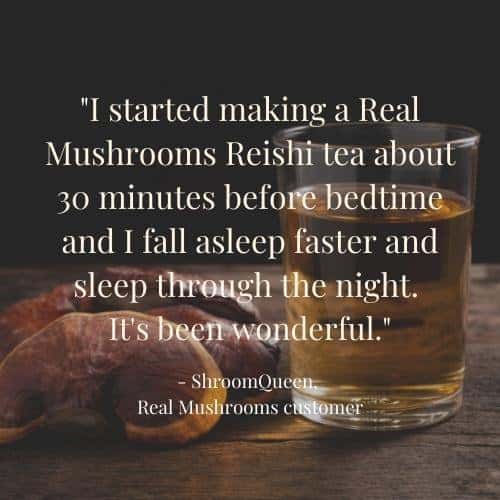
Sleep and Stress: Having trouble sleeping can contribute to higher stress levels and vice-versa
Many companies in the functional mushroom industry claim to sell products that are extracted from pure mushrooms. But this is not always the case.
These products often use mycelium, the mushroom’s root system, which contains fewer health and nutritional benefits than the mushroom (fruiting body) itself.
That’s why it’s important to purchase your mushroom supplements from a trusted source that uses the highest-quality, health-promoting mushrooms extracted in their purest form.
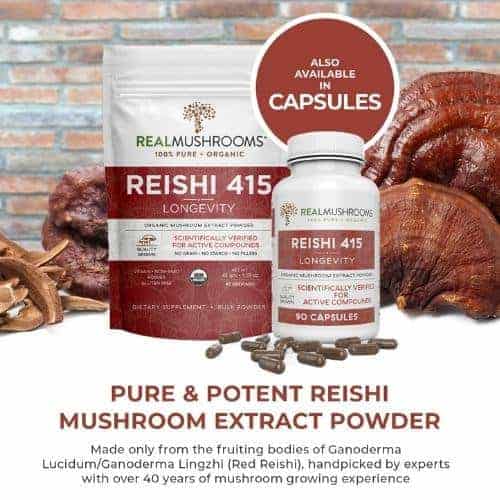
At Real Mushrooms, we live up to our name, producing mushroom extracts from real mushrooms (fruiting bodies) directly sourced from organic farms in China, the birthplace of mushroom cultivation. It’s one of the few places in the world where you can extract mushrooms in their purest form.
"I am impressed after switching from other brands that I found were mycelium and fillers. The difference has been quantifiable." - Patrick, Real Mushrooms Customer
Our Reishi Mushroom extracts have no added starch, mycelium, or grain and are vegan-friendly, non-GMO, and gluten-free.
Order today to enjoy all the benefits that reishi mushroom tea brings.
Remember to check out our other organic mushroom extract capsules from functional mushrooms like chaga, turkey tail, cordyceps, and lion’s mane, which provide these and more benefits.
Shockingly, the reishi mushroom supplement market is filled with fake products. Yes, you read that right. We’re talking about products that are labeled as reishi but contain completely different (and cheaper) mushrooms.
The market is also filled with products that don’t contain reishi mushroom but rather the “root system” called mycelium. This results in supplements with lower potency. Additionally, these supplements often end up containing undesirable starch filler.
Our Real Mushrooms 100% certified organic reishi mushroom powder supplements will provide you with the maximum potential health benefits. Below, you’ll find out how we’ve done that. You’ll also learn what to look for when shopping for the best reishi mushroom supplement for your money.
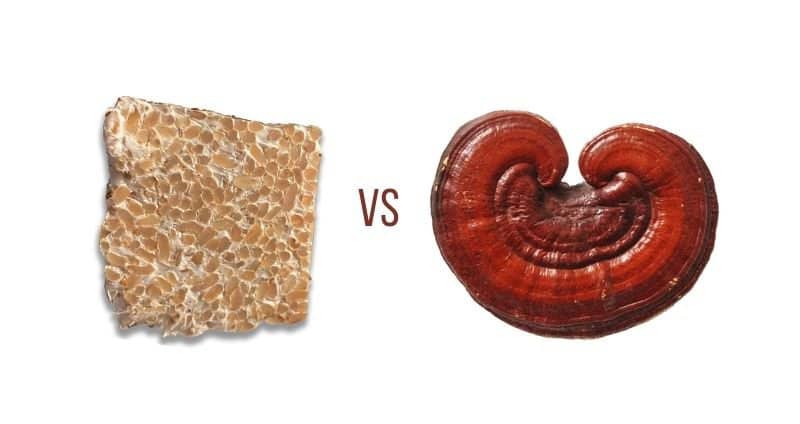
Real Mushrooms was founded in part due to a significant problem we discovered in the functional reishi mushroom supplement industry. The market is dominated by products that make you think they contain reishi mushrooms, but actually contain little to none at all.
Most of these supplements are made using the root system of the reishi mushroom, which is called the mycelium. This network of roots contains very little of the active compounds when compared to the reishi mushroom (fruiting body). However, mycelium is inexpensive to grow for the production of supplements.
The fruiting body is what you would typically think of when you hear the word “mushroom.” It’s what you see growing above the ground. We provide a detailed breakdown of the key differences between the mushroom (fruiting body) and the mycelium (vegetative body) in our article Medicinal Mushroom Benefits: Mycelium vs Fruiting Body.
Also, large commercial growers typically grow the mycelium on a grain-based substrate (the medium it grows on). When harvesting the mycelium, the grain is not separated from the mushroom and goes straight into the final product.
This grain is just filler and provides no health benefits. Between the grain-based filler and the lack of mushrooms, many supplements contain very few beneficial compounds of Ganoderma lucidum polysaccharide extract.
At Real Mushrooms, we strive to create the highest-quality supplements that contain only the reishi mushroom and zero mycelium or grain fillers. That way, people using our products will truly experience the overall health benefits of taking reishi mushrooms they hope for.

Ideally, the reishi supplement you are considering buying should be made of reishi mushrooms instead of mycelium. However, ensuring you get the best reishi mushroom supplement also means knowing the origin and purity of the reishi mushroom itself. If the product label indicates that it uses USDA Organic Certified mushrooms, then you can rest easy that you’re getting a product free of pesticides, chemical fertilizers, or other potential contaminants.
In the video below, Real Mushrooms’ founder and Chief Funguy, Skye Chilton, shows and tells about our organic reishi farm at peak picking time.
A new study entitled “Evaluation on quality consistency of Ganoderma lucidum dietary supplements collected in the United States” was recently published by Nature, which releases the most prestigious scientific journals. The study was performed in partnership with the US Pharmacopeia (USP), which sets standards for pharmaceuticals, food ingredients, and dietary supplement ingredients.
In the study, they tested 19 different reishi mushroom supplements sold in the United States and compared the bioactive components found in each product to those that exist in the reishi mushroom itself. The study’s results indicated that only 5 of the 19 samples (26%) actually contained what the reishi product label claimed.
USP concluded by saying, “The quality consistency of Ganoderma lucidum dietary supplements in the U.S. market was poor, which should be carefully investigated.”
That is quite the statement.
Since day one, Real Mushrooms has been telling people about the difference in supplement product quality on the market and how many products aren’t made from mushrooms and contain high amounts of grain filler. This is reassuring for us as it confirms what we already know.
Ideally, you would buy a reishi supplement that has been evaluated by a third-party lab for authenticity to confirm that the product actually contains reishi. Not only that, but the lab should also confirm the potency (based on the concentration of beta-glucans in the product), and ingredients (mushrooms and/or mycelium content).
ConsumerLab conducted its own research into reishi mushroom supplements and concluded that Real Mushrooms’ Reishi 415 product was their choice among the 7 popular reishi supplements they tested. Their recommendation was based on the purity, beta-glucan concentration, and exclusive fruiting-body content of the Real Mushrooms reishi product.

There are two methods of extracting the active compounds in mushrooms for supplements: hot water extraction and alcohol extraction.
Hot water extraction is done by heating the reishi mushroom in water to extract any water-soluble compounds, such as polysaccharides and beta-glucans. The liquid can either be taken directly or evaporated to leave behind a reishi powder containing only the beneficial compounds.
Alcohol extraction follows a similar process but uses alcohol instead of water to remove any non-water-soluble compounds such as triterpenes.
Which extraction method is best–hot water or alcohol—depends on the reishi mushroom. Because reishi contains compounds that are both water-soluble and insoluble, Real Mushrooms uses double (a.k.a. dual) extraction to create our potent reishi mushroom extract.
The reishi mushrooms are run through both processes, and the resulting liquids are combined and evaporated to make one final extract powder that provides maximum potency and health benefits. This dual extraction method ensures that we capture all the key compounds, from polysaccharides to triterpenes, which are crucial for overall health and well-being. The extract also retains the natural antioxidants found in reishi, which may further enhance its health benefits.
Real Mushrooms offers two products derived from organic reishi mushrooms. Both of these are excellent and convenient ways to add reishi’s potent benefits to your daily routine:
Our 100% certified organic reishi extract is available in powdered form for a variety of uses. It is created with the dual extraction method tested by third-party labs and confirmed to contain the valuable beta-glucans and triterpenes Reishi is loaded with. The reishi mushroom powder form has mait and is guaranteed to contain no fillers, starch, or myceliated grains. This product has many uses in recipes and is a great way to add reishi to your diet.
Recommended dosage: Adults, take ½ to 1 gram per day.
Our capsules provide all the benefits of our Organic Reishi Mushroom Powder, with the added convenience of being in encapsulated form. If you’re looking for the health benefits of reishi without having to think about how to add it to a recipe, this is a great option for you.
Recommended dosage: Adults, take 2 capsules per day.
We’re confident in the efficacy and safety of our products. However, you should consult with a physician before starting any new supplement routine to make sure it’s the right option for you.

Many of Real Mushrooms’ customers have shared how taking our reishi supplements regularly enhances their health and their lives. Below are just a few of their hundreds of testimonials.
Keep reading to also learn why one of North America’s leading clinical herbalists recommends reishi as one of the best natural supplements you can rely on for comprehensive health support.
“After 4 or 5 weeks we noticed that we both felt more ambitious and alert. We have also been sleeping better, which may account for the above vitality. Our goal of a hardy immune system is getting a real boost from reishi.” - Ric
“I don't need caffeine anymore. As a health care worker it gives me a boost of energy and clarity both physically and mentally. No crashing effect. No fillers which is excellent. Just pure and real. No side effects.” - Mu
“It helps with digestive issues and helps me to sleep. Overall improves my health and energy.” - Leilani
“It really helps! I take it every day before bed.” - Ruth
“Real Mushrooms’ reishi are the real deal with no mycelium or substance it’s grown on. I will continue to take these regularly.” - Lisa
Clinical Herbalist Dr. Terry Willard states that he has recommended Reishi the most to patients in his decades-long practice because of its sheer versatility and capacity to enhance our physical, emotional, and even spiritual health.
Dr. Willard calls it “the Merlin of the herbal world” and dives into why he has given it this auspicious title in the video below:
Read one of our other articles about reishi mushroom to learn about its incredibly diverse applications for health and wellness:
Despite their sterling reputation as a potent functional mushroom, reishi (Ganoderma lucidum) mushrooms have far less prestige in the culinary world. They are rarely used as the star ingredient in dishes because reishi’s flavor is commonly due to its earthy, bitter taste while having a chewy and rubbery texture.
Overall, reishi mushrooms are not exactly pleasing to the palate, so it’s no surprise that they aren’t stocked at your local grocery store. Not to worry, reishi mushroom powder to the rescue!
While some Chinese cuisine has managed to utilize Ganoderma lucidum to some degree, it’s far more convenient (and tasty!) to use our reishi powder extract to boost delicious recipes.
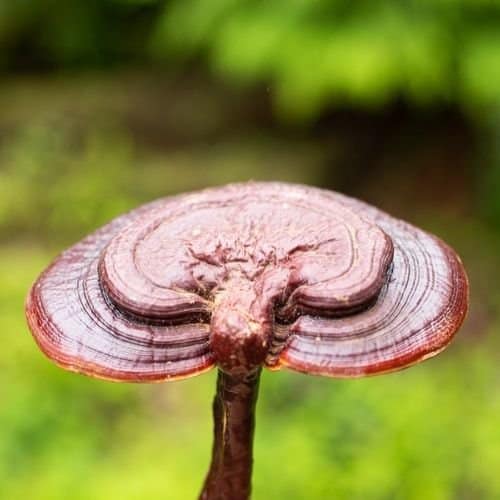
Many healthy concoctions that use reishi mushroom can help with overall health since the ingredient contains beneficial compounds.[1] This includes recipes for reishi tea, reishi-infused coffee, and a wide range of savory and sweet dishes as well.
Here are some convenient recipes from our collection that show off our Reishi 415 Organic Reishi Mushroom Powder.
Click the title of any of the recipes for the ingredients and instructions.
Imagine that when bedtime rolls around, you experience no “tired & wired” or restlessness. You fall asleep easily and even get the good stuff—the deep REM sleep, where true healing lies, all without sleep aids. [2]
No sedating “drugs.” Our delicious golden milk recipe for nighttime uses reishi mushroom powder to help you nod off and get the restful sleep you need while also supporting your immune system.
Reishi’s natural bitterness needs to find some balance somewhere. This bitterness plays perfectly with the sweetness of cacao in this delectable dessert recipe. The taste of reishi mushroom powder is very reminiscent of highly concentrated dark chocolate, so including it in chocolate treats is a natural pairing.
Coconut fans are already familiar with the delicious Bounty chocolate bars. This recipe will help you make a healthier version that provides all the immune-boosting benefits of our reishi mushroom powder. A perfect snack to take with you on a hike!
Chia seeds are a nutritional superstar in their own right, and this recipe for a delicious pudding pairs them with both reishi and cordyceps extract powder for an amazing, nutritional dessert or snack. Flavored with raw cocoa and your choice of vanilla or peppermint extract, this pudding is not to be missed.
To help kick-start your immune system to support a healthy inflammation response, this elixir features our reishi mushroom powder along with a host of other beneficial ingredients. It’s an especially potent drink for the colder winter months.
If you want to keep your reishi-infused dish simple, you c add a ½ tsp of our Reishi 415 Organic Reishi Mushroom Powder to your favorite morning coffee or tea and adjust as needed.
The method you use to get your functional mushroom’s benefits is totally up to you, but you may want to peruse our DIY mushroom coffee recipes for inspiration!
Reishi mushrooms have been used historically in traditional Chinese medicine since its full of nutritional benefits. This makes it an excellent dietary supplement to add to your wellness regimen.
At Real Mushrooms, we use 100% organic mushroom extracts found in our reishi mushroom supplement catalog. They can be used for a wide range of reishi mushroom recepies, from beverages such as reishi mushroom tea to all kinds of deserts.
Read one of our other articles about reishi mushrooms to learn more about their incredibly diverse applications for health and wellness:

